


Welcome to
Welcome to




Welcome to
I am delighted to bring you the first issue of Cadenza for the 20242025 academic year! We are beating the heat with a fresh start in rehearsals and auditions to get the year started, as well as our first Spirit of San Antonio performances this past weekend! We look forward to welcoming you to UTSA’s Main Campus – and several other exciting venues throughout the year – for a wonderful season of performances.
If you are available for a mid-day concert, please join us Sept. 3rd at 11:30 a.m. in the UTSA Recital Hall, when our faculty will present a “Meet the Faculty” concert. It’s a whirlwind program, and a great opportunity for you to meet many of our wonderful colleagues. Our first concert of the year is the ever-popular Sombrilla Concert on September 19th at 7:00 p.m. Read ahead for information about all of our upcoming September concerts.
Feature articles in this issue include our Alumni Spotlight on Roselyn Rios, articles about our veteran beginning band program, On-Corps, our new Bachelor of Arts degree in Digital and Commercial Music, and a new feature – a donor spotlight on Linda Purcell! We hope you enjoy learning about these special people and important elements of our School of Music.
We are inspired to begin a new academic year, continuing the celebration of the 50th anniversary of the School of Music at UTSA, and we are grateful for all of you who support the work we do to learn and share music with those around us. As we begin this new concert season, we look forward to warmly welcoming you to celebrate with us all that the arts bring to our lives!
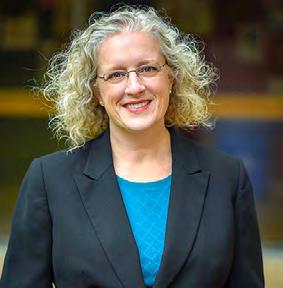
Tracy Cowden
Roland K. Blumberg Endowed Professor in Music Director of the UTSA School of Music

June 21, 2004 - August 04, 2024
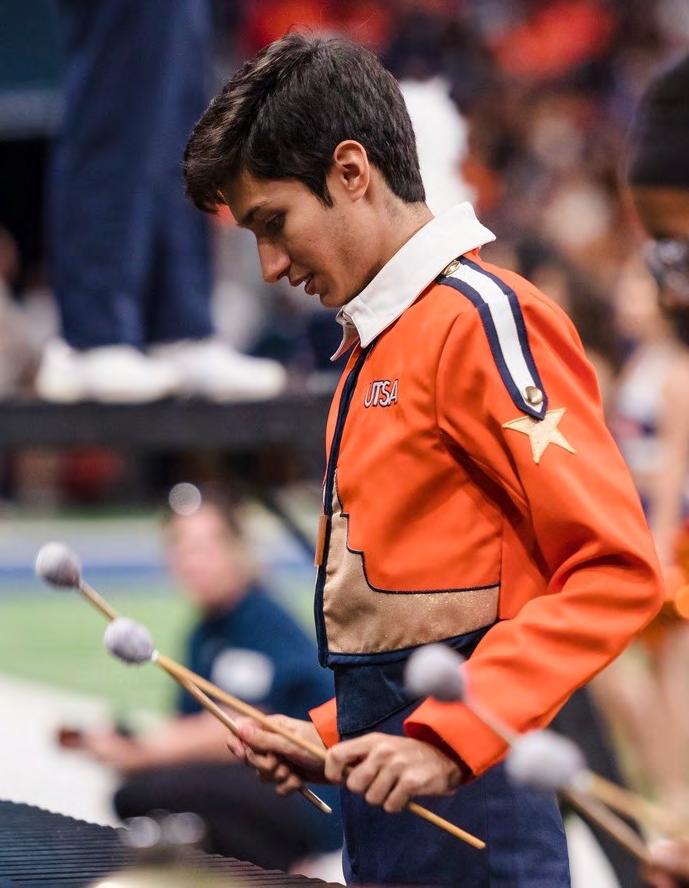
“Where Words Fail, Music Speaks.”
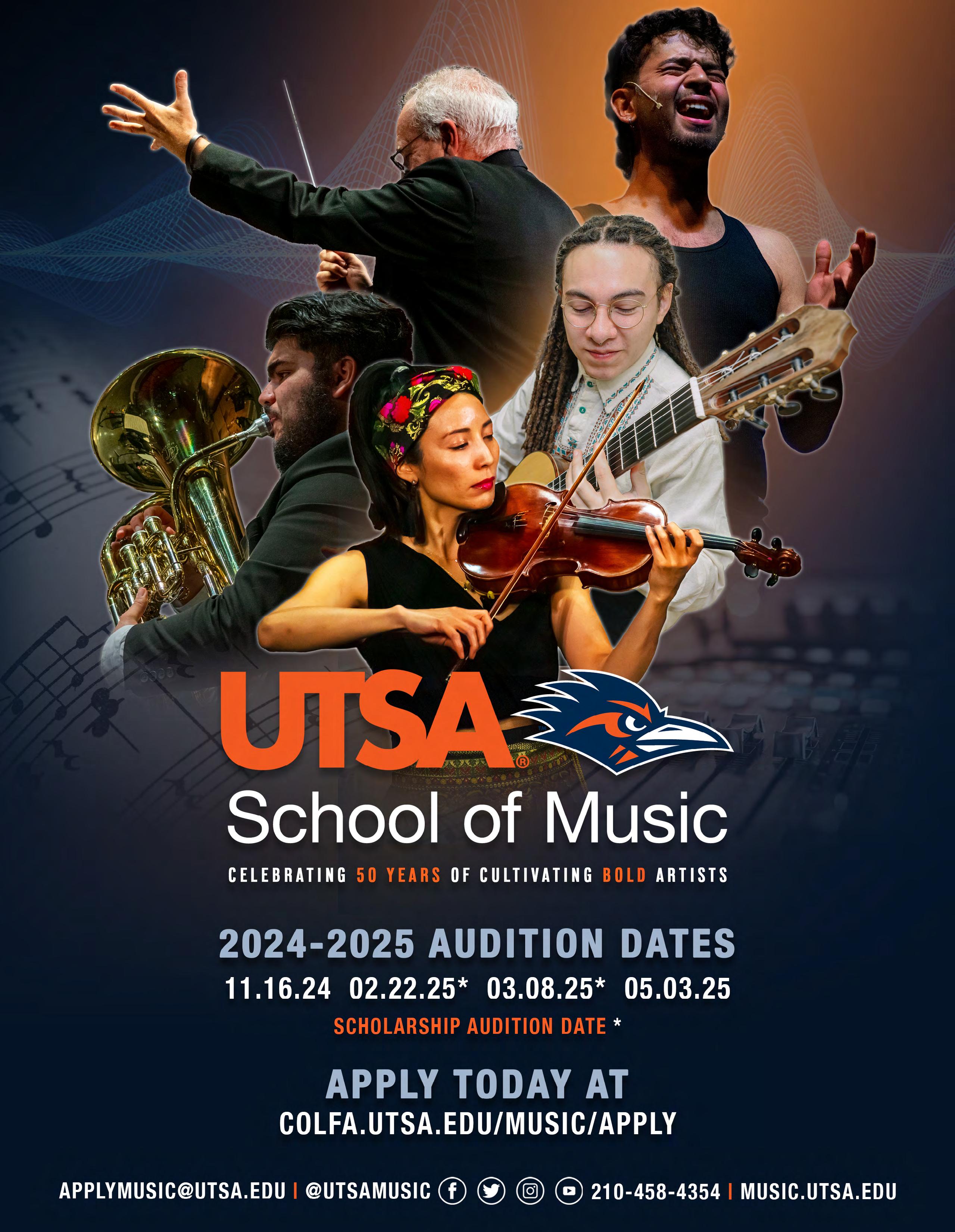
UTSA’s beginning and intermediate band program has impacted the lives of veterans by providing a source of mental stimulation and emotional health support
By Rolando Ramon | Photos by Breanna Castillo
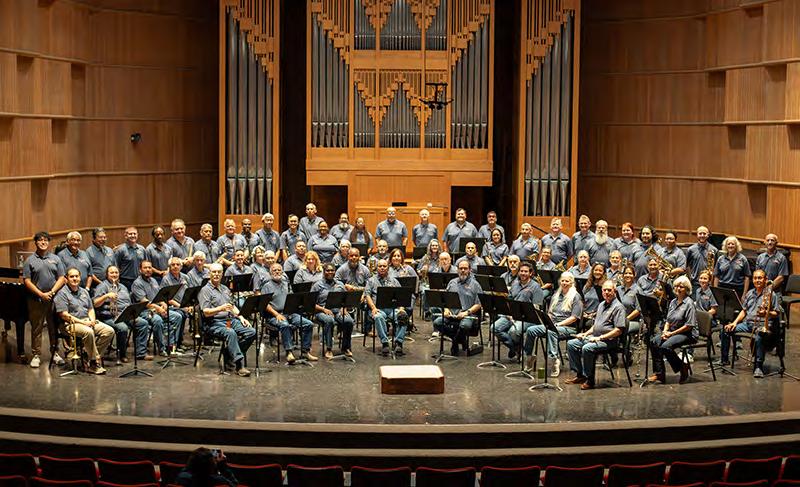
Since its launch in September 2022, On-Corps has provided veterans with an outlet for artistic expression and created meaningful relationships. Though still early in its existence, the program shows significant potential for transforming the lives of veterans and being a case study on the benefits of music for health and well-being.
On-Corps is a community engagement program offered to U.S. veterans by UTSA Arts at no cost to provide an artistic challenge and foster camaraderie among its members. It includes instrumental instruction and live musical performances for its members. The program was established by UTSA School of Music director Tracy Cowden, inspired by the existing New Horizons International Association to create a beginning and intermediate band for veterans. The class meets for two hours every Saturday in the fall and spring for group sectional lessons for woodwind, brass, and percussion instruments and large band ensemble rehearsals.
Though only having existed for two years, On-Corps and its veteran students, some of whom entered the program without any prior musical experience, have made remarkable progress across four semesters of weekly classes. It has grown from its first class of 23 to 80 members as of last semester and comprises three ensembles: Missions Band (beginner), Alamo Band (intermediate), and 210 Jazz Band. All three ensembles perform a concert in the UTSA Recital Hall at the end of every semester.
A highlight from the previous semester included a performance of the national anthem by members of the Alamo Band at a San Antonio Missions baseball game. It was the first public outreach performance for On-Corps in the wider San Antonio metropolitan area. On-Corps has already received multiple invitations to perform at other venues in San Antonio leaving the door open for more opportunities to spread word on the program
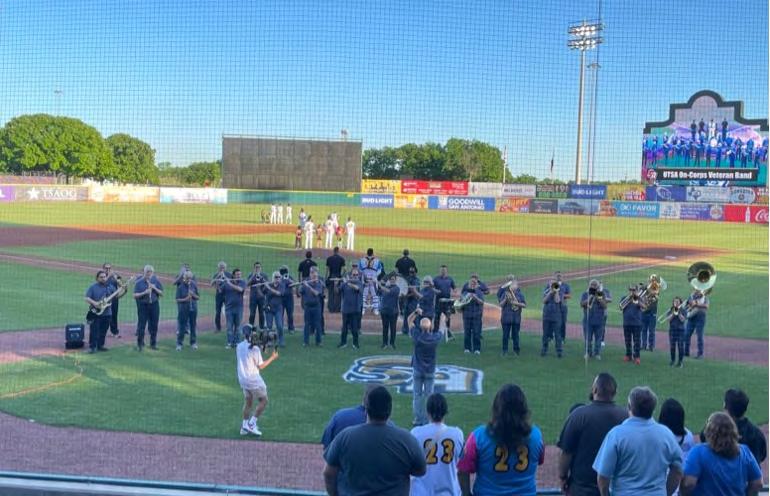
“It’s exciting to realize that we can start to begin to look at a little more challenging music because the folks have made such progress, and the group has gotten larger,” said On-Corps director Dean Zarmbinski.
Many of the veterans in the program have attested to its positive impact on them. The impact ranges from alleviating anxiety and depression to veterans finding a renewed sense of purpose and meaning in their lives.

“I was brand new to music, never touched an instrument in my life, don’t know how to read music…going on two years now [in On-Corps], I would say it’s had a pretty big impact on my life,” said David Mercado, who plays trumpet in On-Corps. “It’s been like learning a whole new language.”
Mercado spent four years in the Army and another four in the Coast Guard during his military career. Participating in On-Corps for two years and his increased interest in music has led to him purchasing his own instrument and taking lessons from a private tutor. He’s also observed how the program has given other veterans a new hobby and passion to enrich their lives, as it has for him.
“It’s something to get them out,” said Mercardo. “They get to be in the community again and be around fellow vets, and it’s something positive to look forward to...playing and reading music helps keep our minds active.”
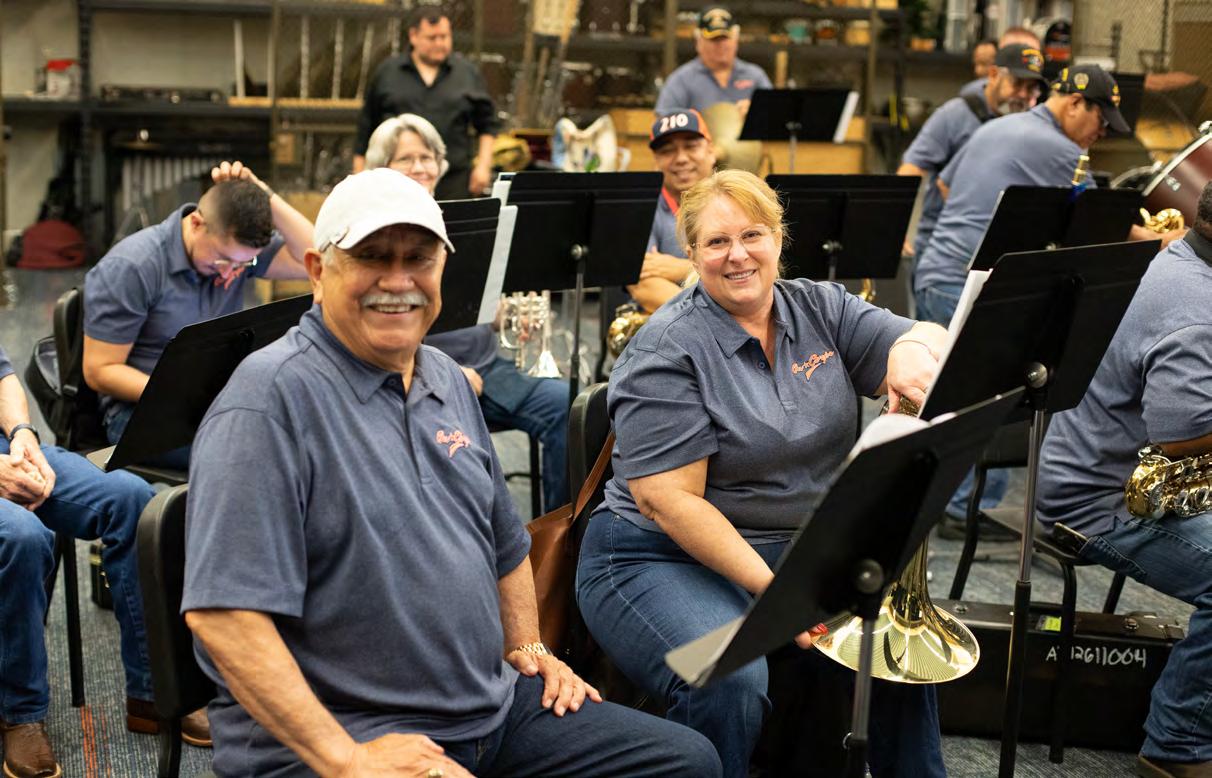
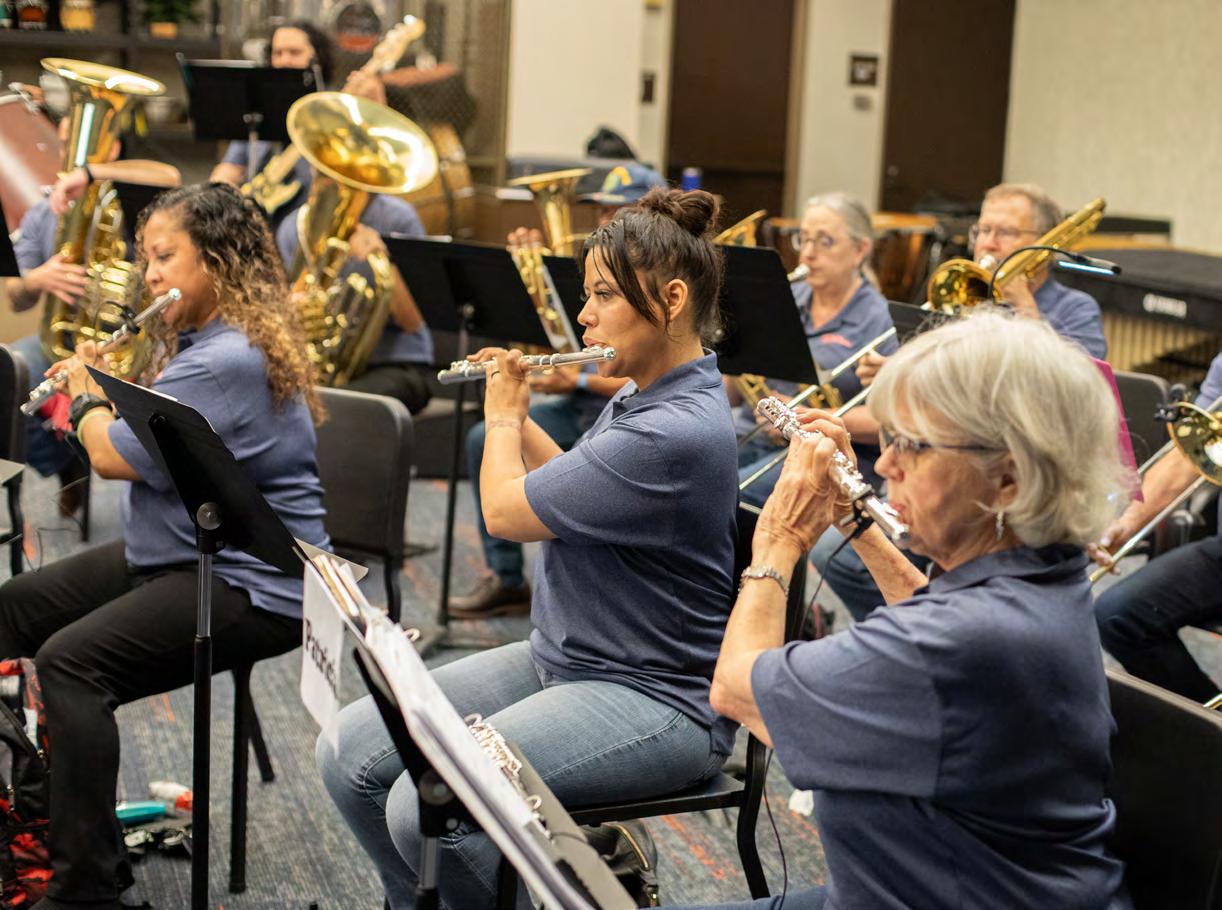
On-Corps is diversified by veterans with different military backgrounds. Some of the more experienced musicians served in military bands during their careers, while others had never touched an instrument in their lives. However, the mutual trust between the veterans as former military members creates a level of comfort that allows the members to open up.
“We have a vast variety of musical experiences. But more than that, we have a depth of military experience. And everybody accepts each other,” said Patricia Snelson. “We’re all welcome because we’re one brotherhood.”
Snelson is a former Women’s Army Corps member, an auxiliary unit of the U.S. Army that was active from 1942 through 1978. She is a flutist in the On-Corps, though she primarily plays piccolo due to its lighter weight and less strain on her neck. She’s also a member of a New Horizons chapter in Washington, the program that inspired On-Corps.
“We’re all different services, Coast Guard, Navy, Army, Air Force, Marines… we’re all here for one purpose. We’re all one cohesive unit that’s very warming and rewarding to be a part of…I think that’s healing for many veterans,” Snelson said.
In addition to these different experiences, the members lead vastly different lives with their own challenges. 7% of all veterans have or will experience PTSD in their lifetime, according to statistics from the National Center for PTSD. The therapeutic and healing aspects of the program were touched upon in On-Corps, a documentary directed by UTSA Film and Media student Ireland Robinson that focuses on capturing the veterans’ experiences.
“Some of those [veterans] that are in this program have gone through quite a bit. [Some] had experiences that were pretty traumatic,” said On-Corps’s assistant director Juan Garcia.
One of the participants, Ed Silva, who was featured in the documentary, found healing through On-Corps and other musical activities when his wife passed away after being married for 56 years.
“I joined the choir, joined On-Corps…I try to stay busy. I have to keep my mind occupied, but I still go to the cemetery to see her,” Silva said.
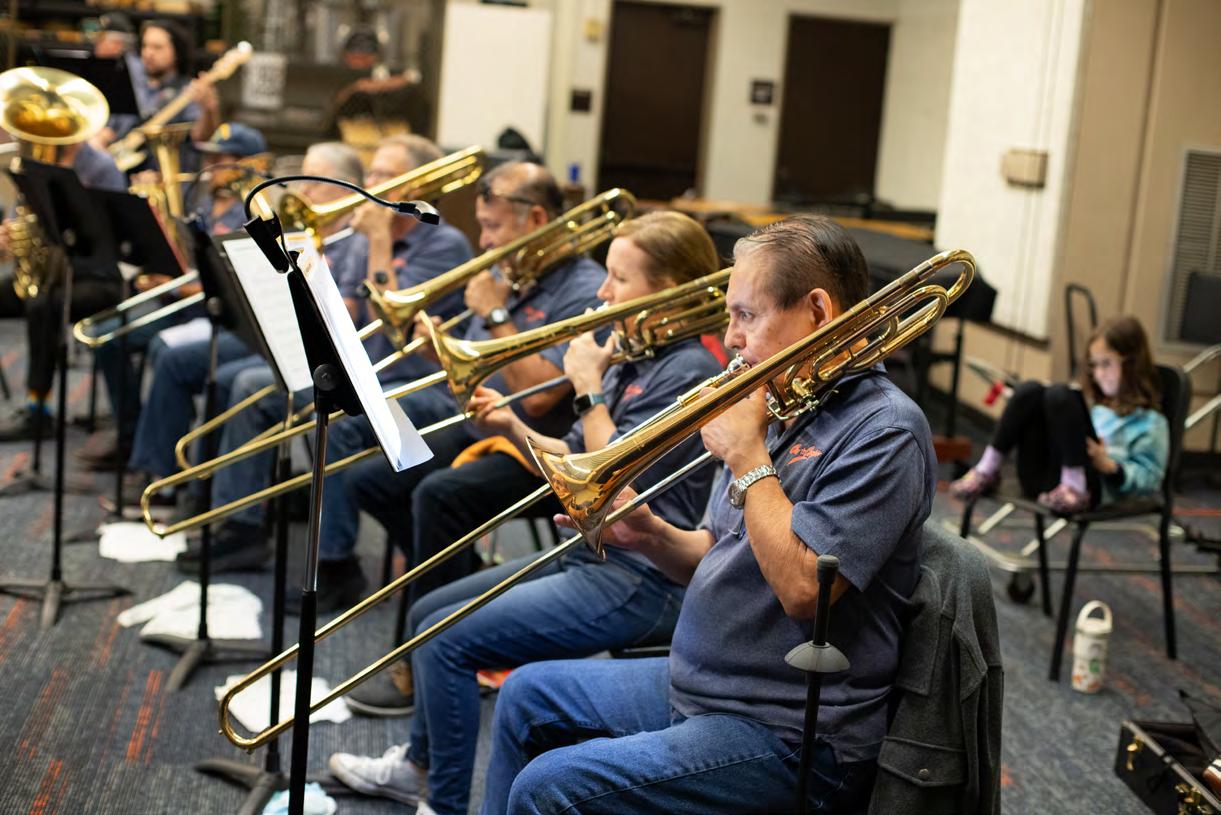
“It’s helped it tremendously…music had a lot to do with ‘me’ coming back. It’s like my mind is in a different place now,” said Silva.
Silva was his wife’s caretaker for six years until she passed due to Alzheimer’s and dementia. In the process, he neglected his own physical and mental health before picking up the trombone and joining OnCorps.
Since joining in September 2022, Silva has maintained a weekly practice routine yearround in addition to fall and spring rehearsals, even participating in meetups with other members of the trombone section for sectional practices. He’s noticed that the program has become a source of emotional healing from past trauma for himself and others.
“For veterans, it’s therapeutic…I’ve noticed some of them used to go into there with their [service] dogs. Some of them have PTSD and other issues, but they brought that to the table, and it seemed to have helped them,” Silva remarked.
The positive impact that On-Corps has had on its veterans has also been observed and, as a result, extended to Director Major (ret.) Dean Zarmbinski, former commander of the Air Force Band of the West.
“There are several folks in the band that do have mental health issues, and I think music is a powerful thing,” said Zarmbinski. “It can have such a profound psychological impact for some people.”
Zarmbinski’s time spent directing the ensemble of veterans is entirely volunteered. His compensation has been to lead and witness the band’s progress.
The band is co-directed by Juan Garcia, a retired Sergeant First Class who served a long career in the Army Band. He now serves as Assistant Director for On-Corps
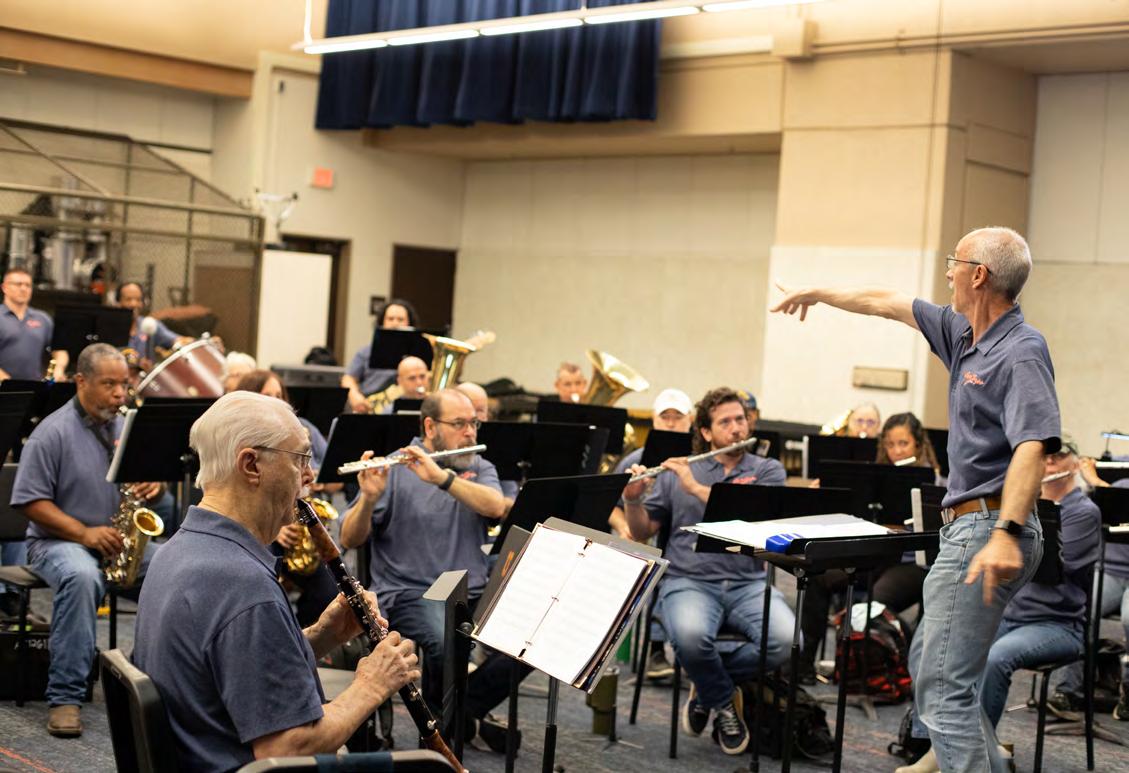
“The progress that I see…it’s amazing to get somebody that knows absolutely nothing, and after a couple of weeks, if they apply themselves, of course, you see the progress, and you see the enthusiasm,” said Garcia. “It’s very satisfying. I had forgotten how much I enjoyed teaching.”
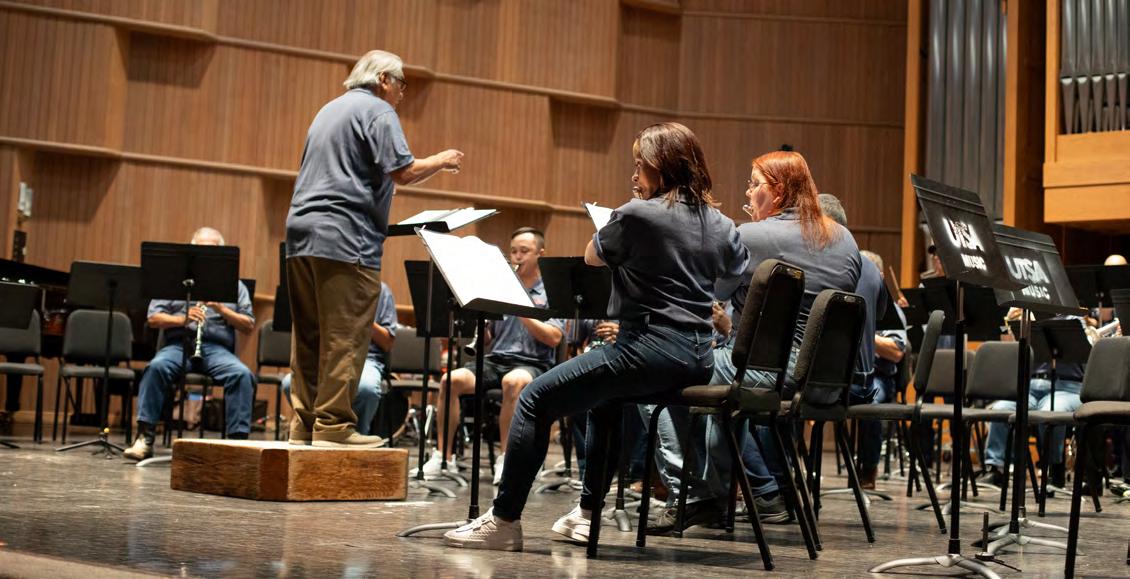
As On-Corps continues to grow, so does its national reputation. The program has begun to capture the attention of other nationwide institutions looking to begin their own. One year after the program’s launch, an ensemble called The Congaree New Horizons Armed Services Veterans Band was formed in affiliation with the University of South Carolina’s Congaree New Horizons Band Program. Further development and growth of these programs will be assisted by the Music for Veterans National Association (MVNA), a national advisory organization of which Tracy Cowden and Dean Zarmbinski are both on the Advisory Board.
Garcia emphasizes that trust between the veterans and staff has been key to On-Corps’ success.
“I think those veterans look up to me because I tell them right off the bat, ‘Look, I’m a veteran too. I was in an army band for all these years.’ They relate to me, which makes them open up a bit more,” Garcia said.
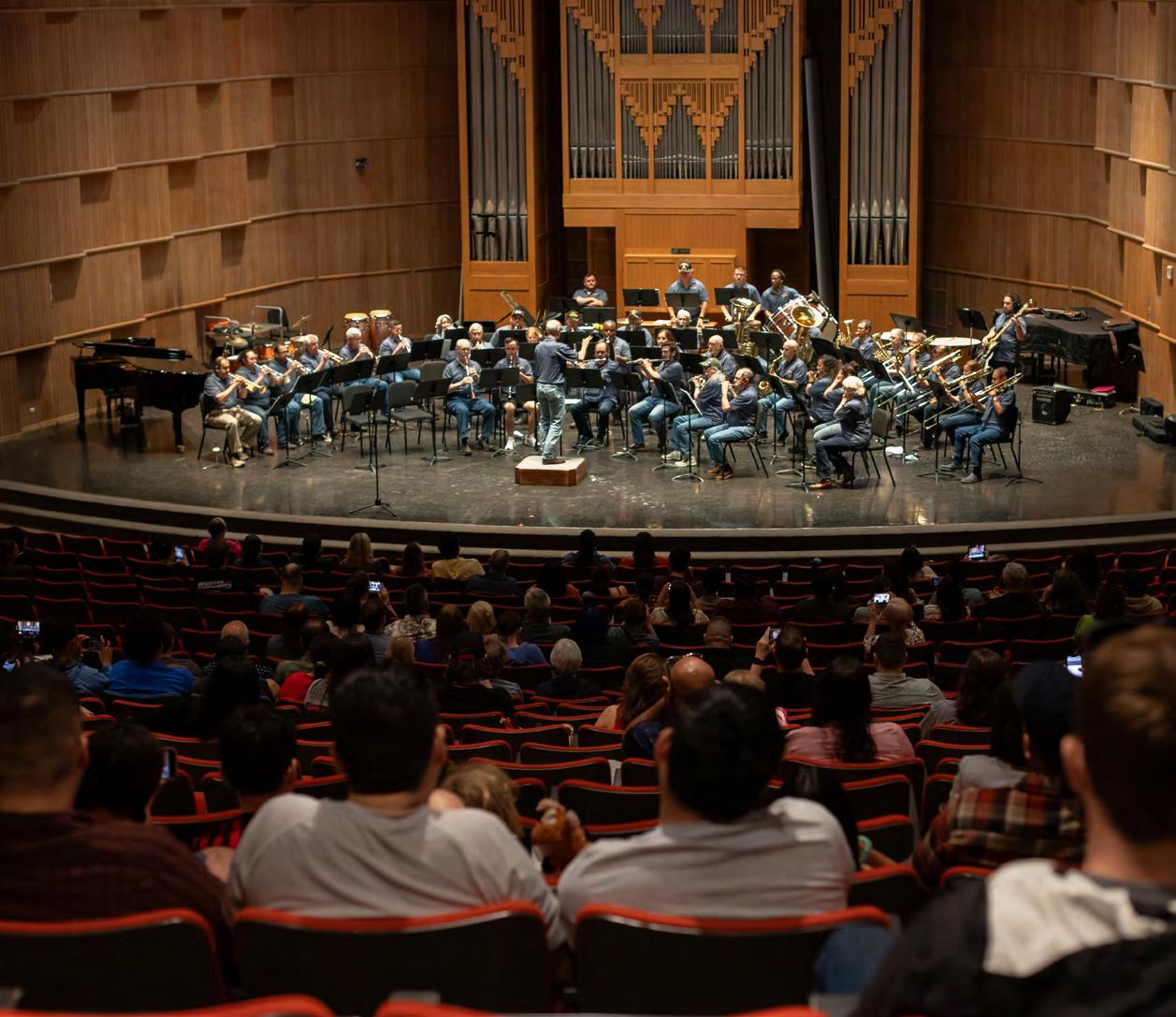
Several veteran service organizations in San Antonio are distributing information about On-Corps to their members, with handouts such as flyers and cards distributed at veteran information fairs in Kerrville and San Antonio in the Summer of 2024.
To further develop the vision for the On-Corps program, an Advisory Committee is in the planning stages. It is anticipated to include representatives from the participants, leadership, UTSA, and the broader San Antonio community.
On-Corps is offered at no cost to veterans in order to eliminate barriers to entry. The program is generously supported by grants from the Stumberg Foundation, the Texas Commission on the Arts, Feherty’s Troops First Foundation, and the San Antonio Area Chevy Dealers, as well as by individual contributions.
Become an On-Corps donor today and help change veteran lives through music.
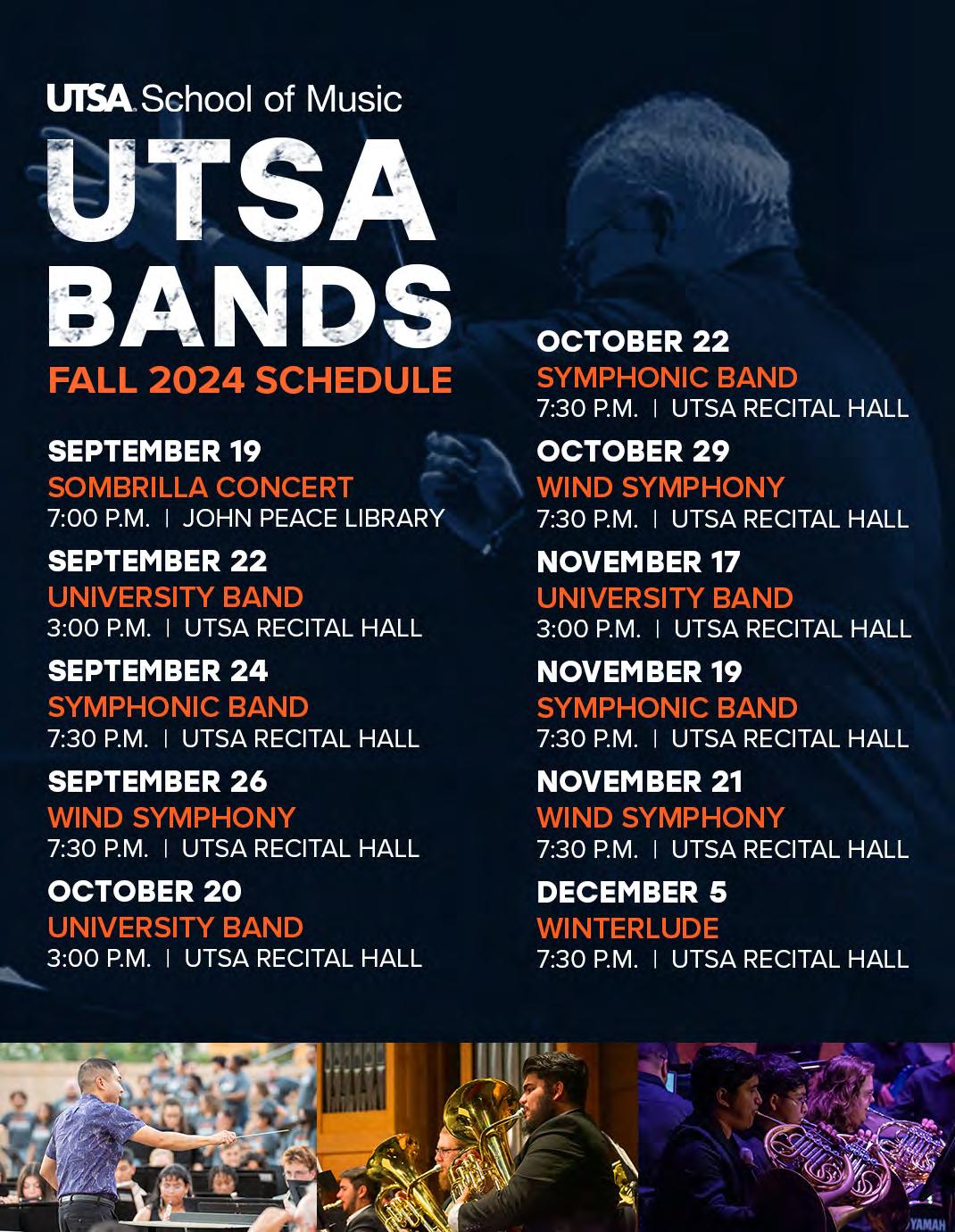
Introducing the UTSA School of Music’s newest faculty members!
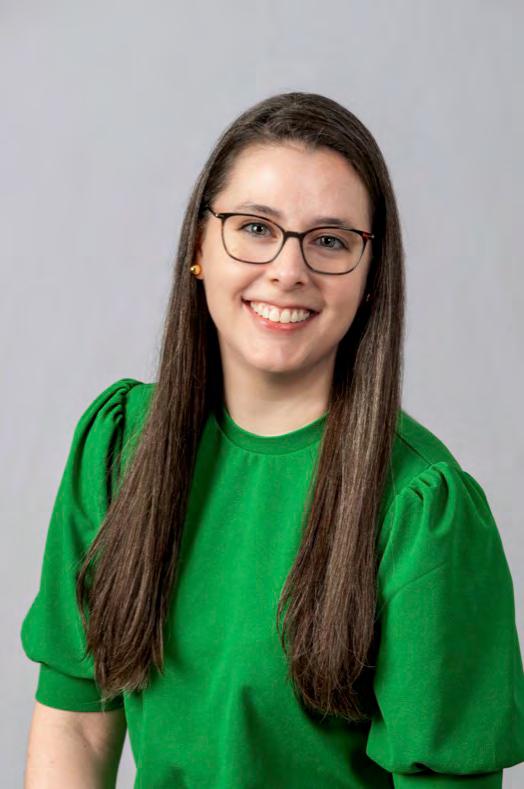
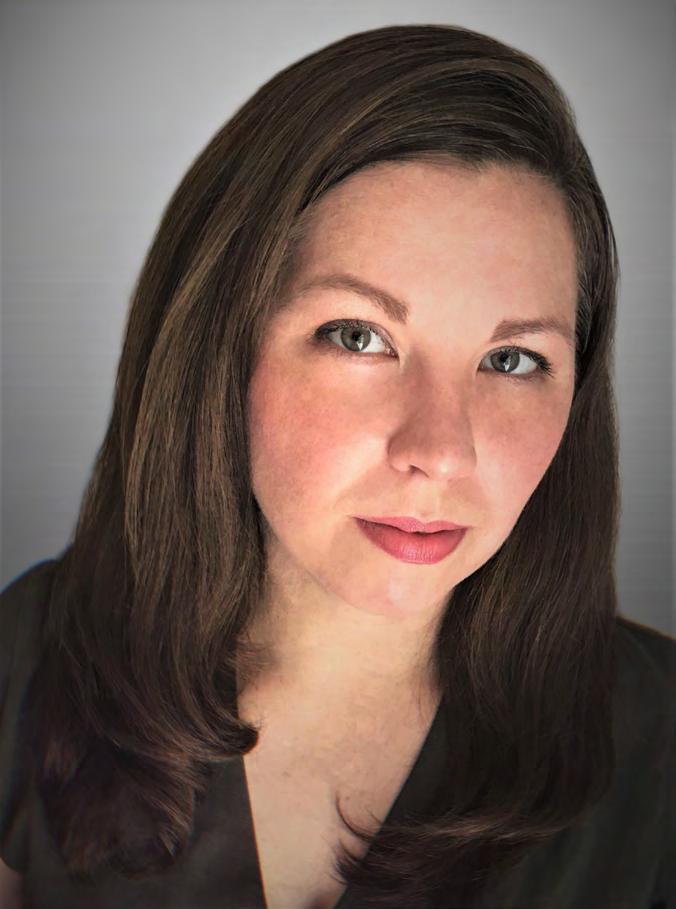
Professor of Instruction, Music Education
Dr. Elizabeth Schultz is a music educator who previously served as a music education faculty member at Cleveland State University, the University of Florida, and Shenandoah University Conservatory of Music. Her research interests include itinerant music teaching, effectively integrating students with disabilities into music classrooms, and connecting music education research to practicing music educators. Dr. Schultz completed her PhD in Music Education at the University of Florida, her MM in Clarinet Performance from Louisiana State University, and her MAED in Curriculum and Instruction and BA in Music Education and Clarinet Performance from Virginia Tech.
Soprano Lydia Beasley is an active performing and teaching musician in the San Antonio area. She has performed with Peabody Opera, Emerald City Opera, The Figaro Project, Erie Opera, Birmingham Music Club, and University of Alabama Opera in such roles as Mimì in La Bohème, Donna Anna in Don Giovanni, Countess Almaviva in Le nozze di Figaro, Frau Fluth in Die lustigen Weiber von Windsor, Marietta in Naughty Marietta, and Mrs. Garland in the world premiere of Amir Zaheri’s Freedom and Fire! A Civil War Story. An experienced oratorio soloist, she has appeared in Texas, Alabama, Maryland, Pennsylvania, Virginia, and Italy in Mendelssohn’s Elijah, Poulenc’s Gloria, Honegger’s King David, Haydn’s Creation and Lord Nelson Mass, and Monteverdi’s Vespers of 1610. Lydia holds a B.M., summa cum laude, from Shenandoah Conservatory, an M.M. from Peabody Conservatory, and a D.M.A. from the University of Alabama. Previous teaching appointments include Trinity University, the University of Alabama, Mercyhurst University, Southern Virginia University, and Judson College. She is a member of the National Association of Teachers of Singing and has previously served on the National Opera Association’s Opera Production Committee and the Board of Directors of the Children’s Chorus of San Antonio.
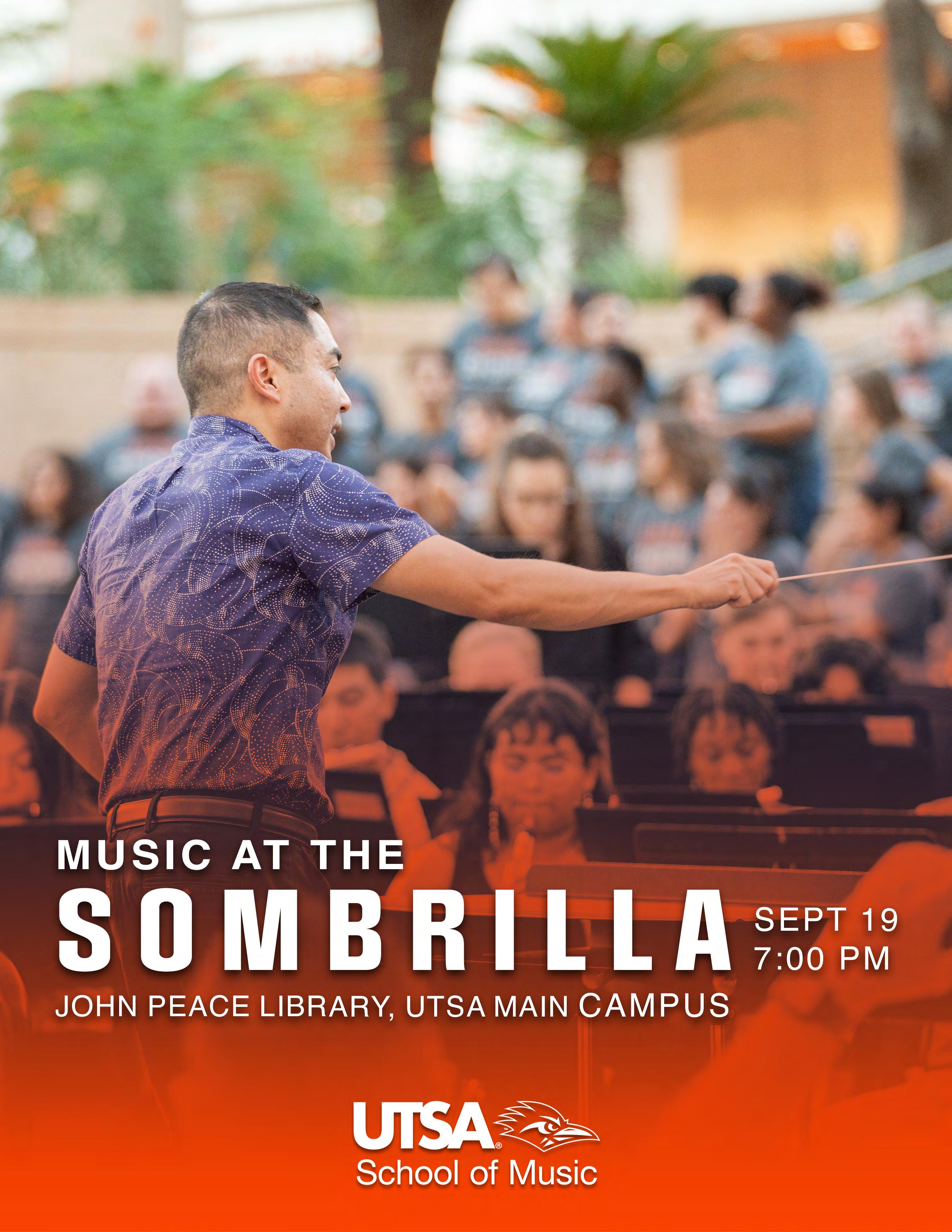
The School of Music’s new Bachelor of Arts in Commercial & Digital Music degree introduces its first class and opens the gates for more artists to attend music school.
By Rolando Ramon
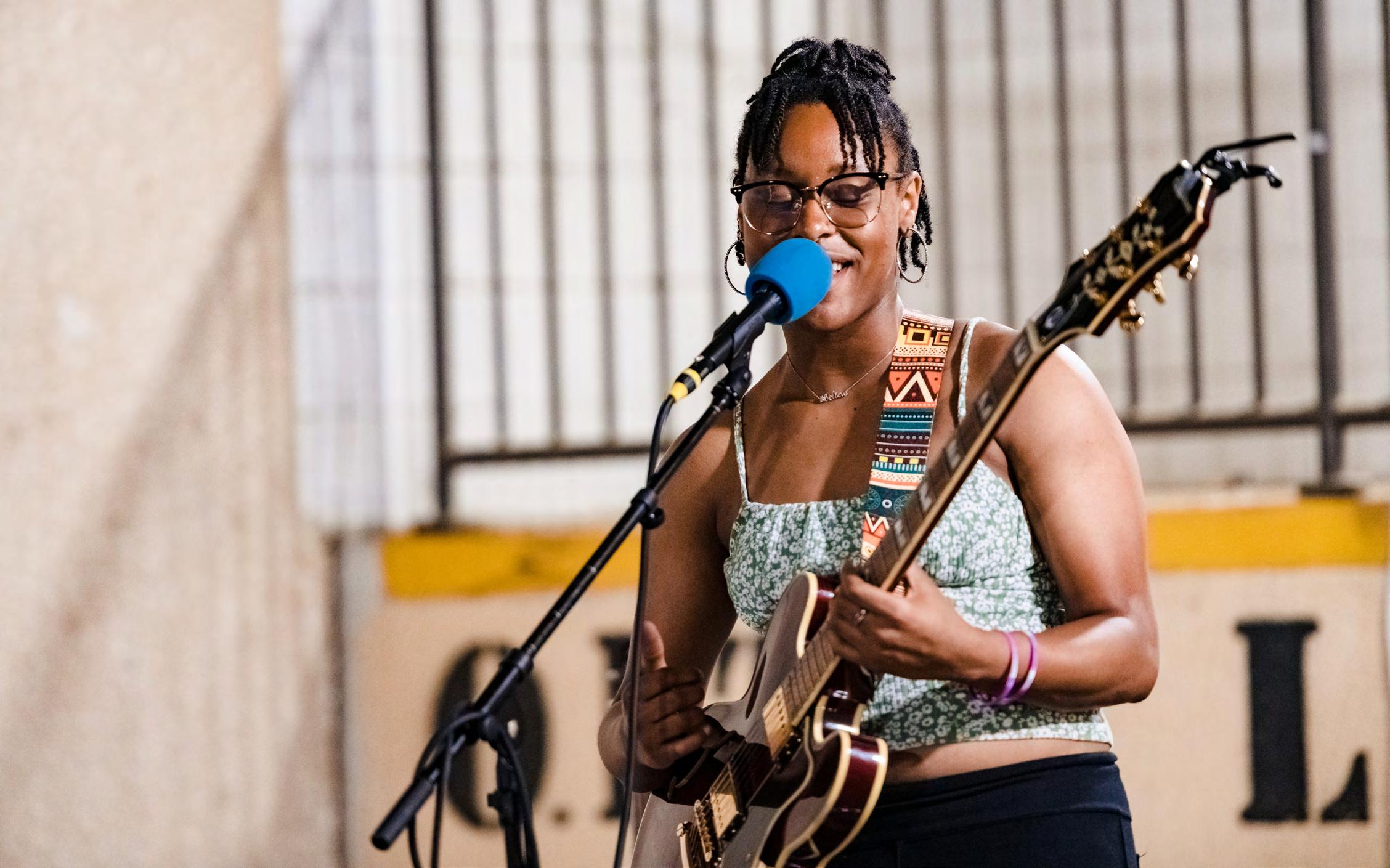
UTSA Underground, an annual student-organized music/arts festival, has long shown the wide variety of artists that exist among the university’s student population outside the School of Music.
The UTSA School of Music will break convention this Fall with its new degree plan: a Bachelor of Arts in Commercial and Digital Music. Over 30 students, more than half of whom are incoming freshmen, have registered for this new degree that will expand the school’s academic offerings and provide broader community access to higher learning in music.
The BA in Commercial and Digital Music addresses how cultural and societal changes have impacted the creation and consumption of music. Now more than ever, music graduates need skills beyond musicianship and theory comprehension to lead successful careers. This degree addresses the dissonances
The program caters to students with diverse musical interests seeking learning pathways outside Western Classical tradition and orthodox music training. It incorporates courses in songwriting, film and video game music, popular music styles, music industry, audio engineering, digital media, and music history and culture to create a curriculum that students can customize according to their focus area. The degree’s focus areas include Music Technology, Composition and Production, Music History and Culture, and Music Performance.
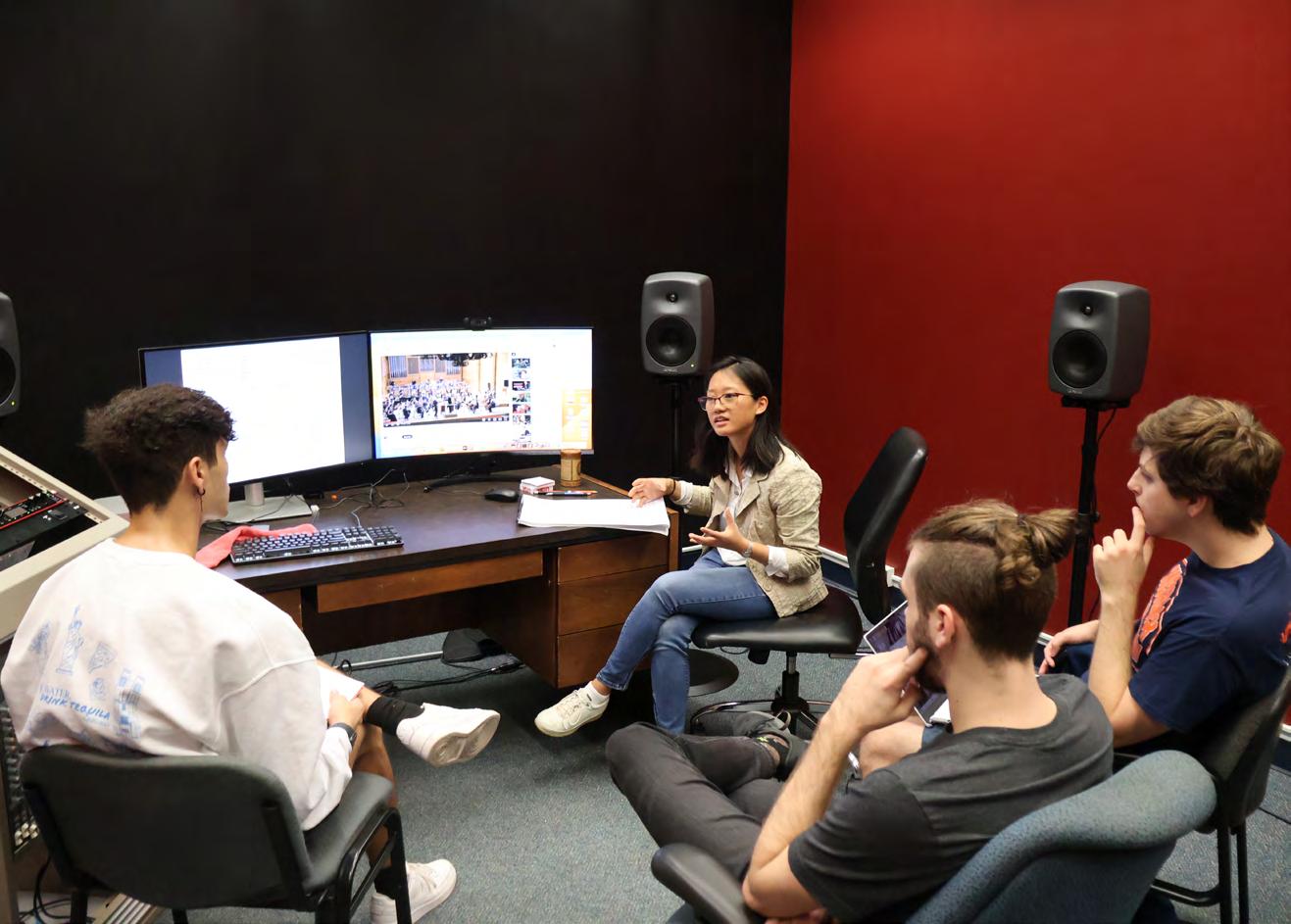
Admissions for this degree will also have a new look, with students able to audition with electronic and multicultural instruments and vocal styles. Students can also audition through a digital audio workstation (DAW) to showcase their skills in audio production. These new methods of determining auditions provide access to prospective students in ways previously unexplored, mirroring the incredibly diverse community surrounding UTSA and various careers within the music field.
The degree’s structure as a Bachelor of Arts program also allows for more flexibility in course choice through non-music electives to enhance or complement their degree focus area. The practicality of having a degree balanced with music courses and studies in other areas, such as marketing, film studies, communication, and business management, would allow students to graduate with a well-rounded skill set and portfolio. This would bode well for preparing graduates ahead of the employment growth rate projected for the remainder of the decade in particular areas of the media industry. The Bureau of Labor Statistics predicts a 10% growth in employment for broadcast, sound, and video technicians from 2021 to 2031, with 13,200 annual job openings. Music producers, music directors, and composers are expected to see a 6% growth from 2020 to 2030, with 20,800 annual job openings.
Other careers coinciding with the degree plan material include artistic management, tour managers, A&R coordinators and representatives, concert promoters, and music streaming analysts.
Additionally, the BA intersects with other programs within the UTSA School of Music, such as the BM in Music Marketing and Minor in Music Technology, through common courses in audio engineering and music business. This allows students pursuing the new degree plan to efficiently network within a larger cohort with similar focuses during their studies. Students will also be able to participate in music ensembles, including Contemporary Studio Ensemble (MUS 3931), a new course created for the degree.

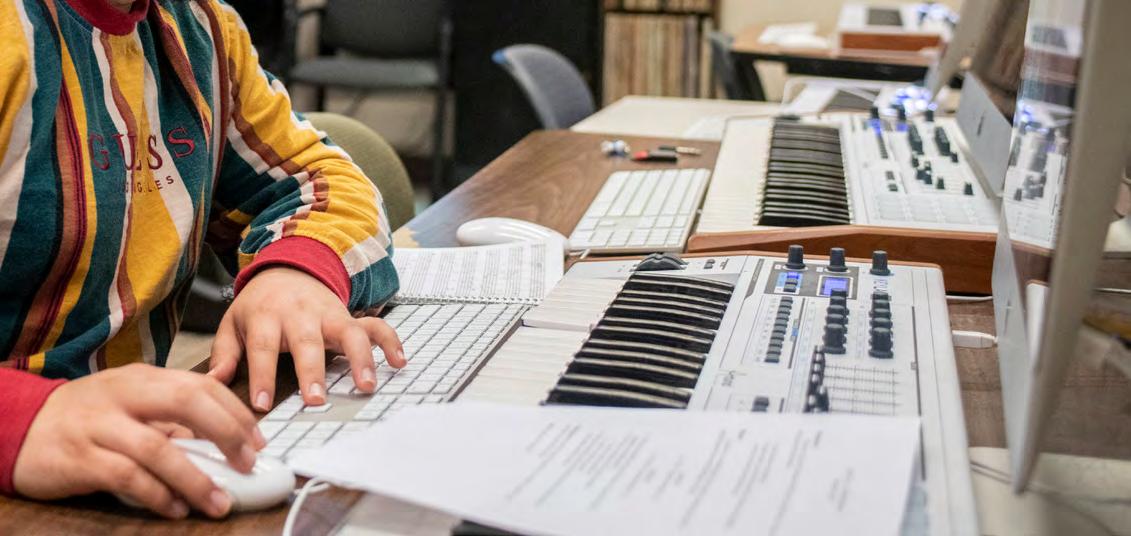
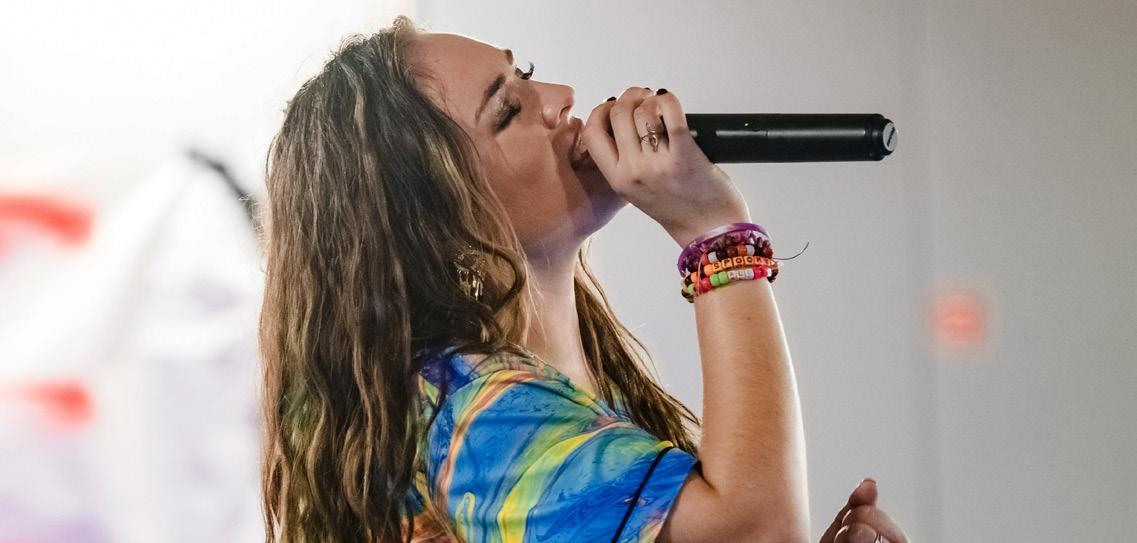
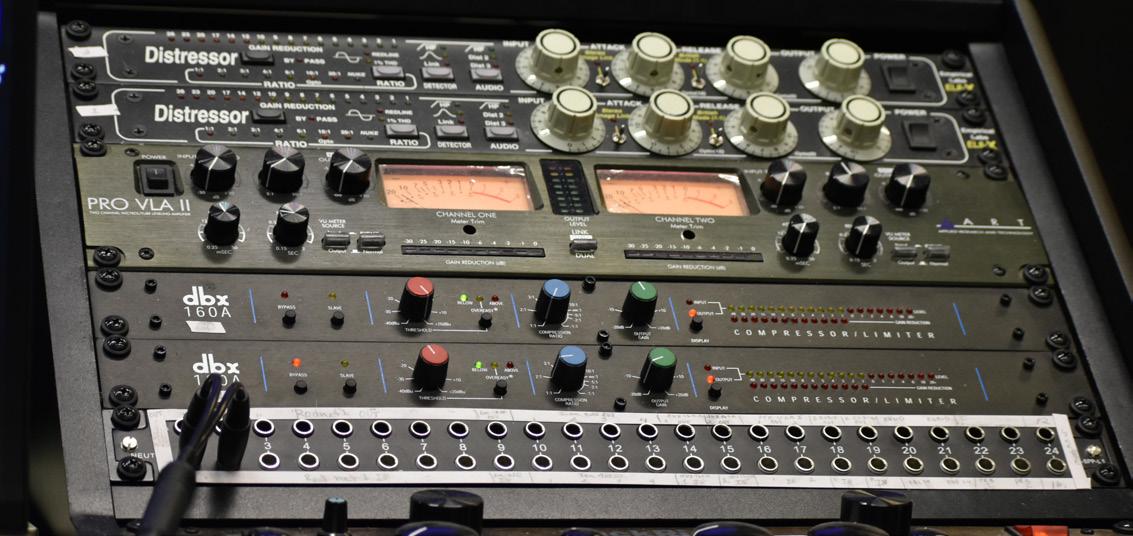

DIGITAL MEDIA
AUDIO ENGINEERING SONGWRITING FILM AND GAME MUSIC
Apply for a flexible new program that welcomes students from diverse musical backgrounds who have varied interests in the evolving music industry.
Craft your curriculum by completing courses in three of four focus areas:
COMPOSITION AND PRODUCTION
MUSIC HISTORY AND CULTURE
MUSIC PERFORMANCE
MUSIC TECHNOLOGY Are you interested in...
Use non-music electives to minor or double-major in related fields:
BUSINESS
MEXICAN-AMERICAN STUDIES
FILM STUDIES
LANGUAGE STUDIES
DANCE
COMPUTER SCIENCE AND MORE...
LEARN MORE AND APPLY AT MUSIC.UTSA.EDU
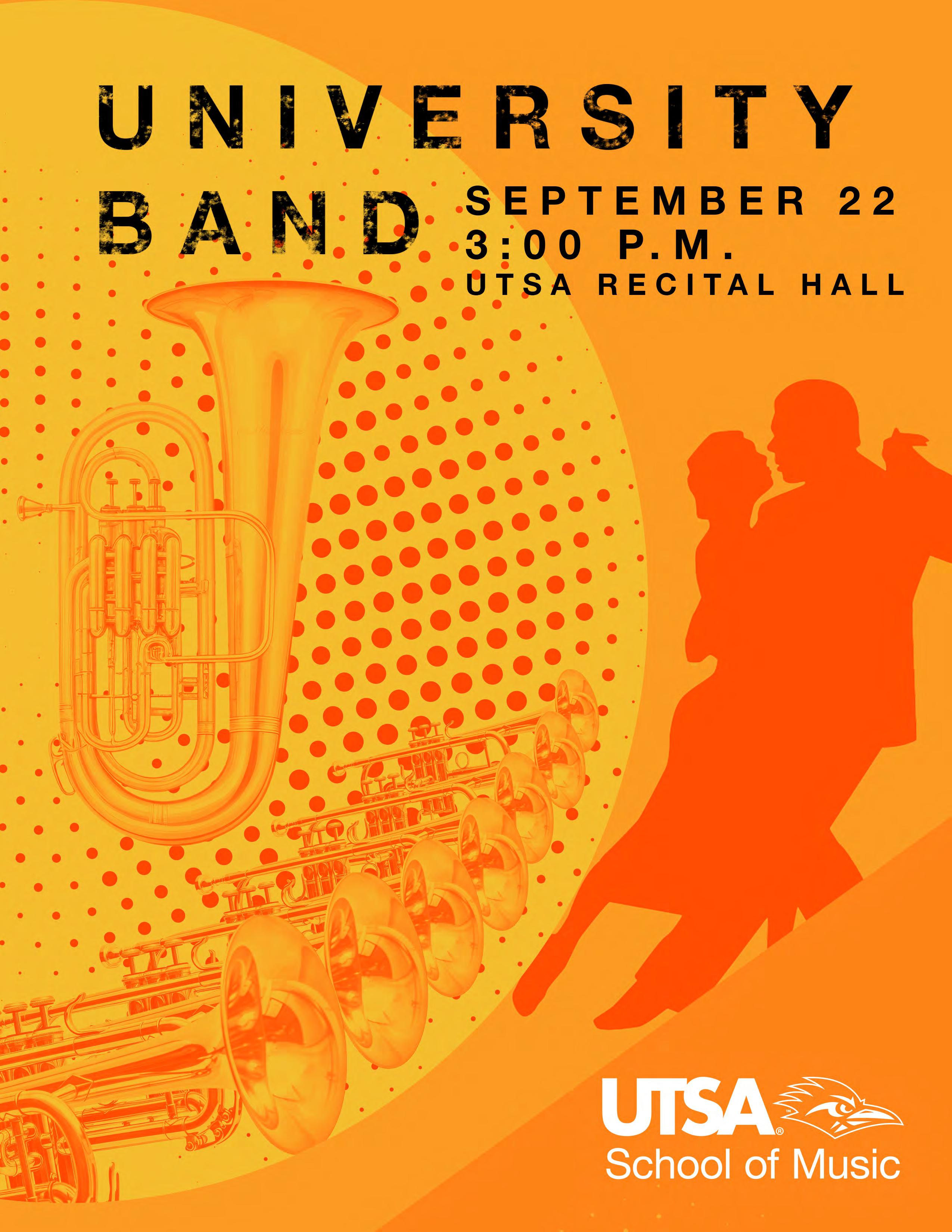
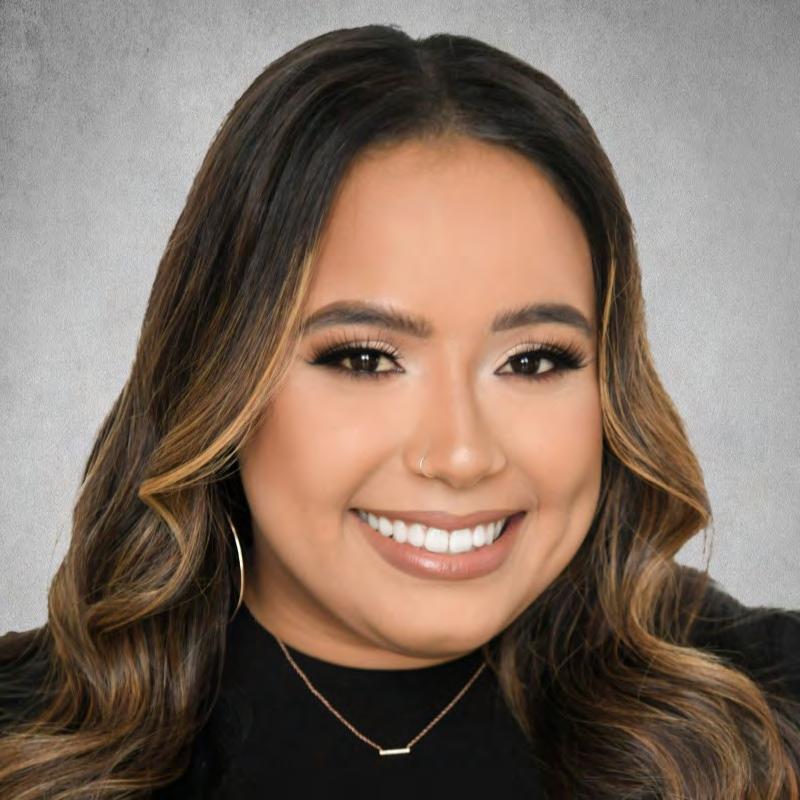
BM Music Marketing, 2019
Digital Content Coordinator, Houston Grand Opera
Alumni Spotlight returns for Fall 2024 to highlight a recent UTSA music alum working for one of Houston’s major art organizations. Roselyn Rios ‘19 studied music marketing at UTSA under former program director Dr. Stan Renard and received her Bachelor of Music in May 2019. She now works as the Digital Content Coordinator for the Houston Grand Opera.
What were some deciding factors that led you to study music marketing at UTSA?
“Back in high school, I was very involved in several music groups and organizations. At some point, I joined a youth orchestra called Virtuosi of Houston. During my time there, I shadowed the program’s Director of Operations. I loved performing on stage…but I was also very interested in [questions] like, ‘How do people make this happen?’ ‘How do we bring this on stage?’ and ‘What is the process that goes into planning a season or a concert?’ Interning with Virtuosi really got me interested in the operations and marketing side of working for a nonprofit music organization. So that motivated me to apply to different colleges that had [programs with] similar career paths…and I just fell in love with San Antonio and UTSA’s campus, so that’s where I decided to go. I had a great experience doing my audition and meeting the professors there.”
How did your experiences at UTSA have a meaningful impact on your growth and career direction?
“I had an incredible four years there under the direction of Dr. Renard, Dr. Dowdy, Dr. Westney, Dr. Davis, and Dr. Pellegrino. All our professors were truly amazing, and they genuinely cared. They always had an open-door policy…I can attribute much of my growth and success to them and many of my colleagues I met along the way. And I felt like [UTSA School of Music] was small enough to where everybody either knew each other or knew of each other.”
For my senior marketing project that I had to do as part of my degree, I decided to market my own senior recital. I created plenty of marketing materials, I utilized social media, and I published video blogs. I named it La Vie en Roselyn in honor of my advisor and project supervisor Dr. Renard, who is French. It was a ‘full circle’ moment for me, especially since it was what I had been working towards during those four years. Promoting, collaborating, networking for this project…I loved every step of it, and I wanted to make a career out of it.”
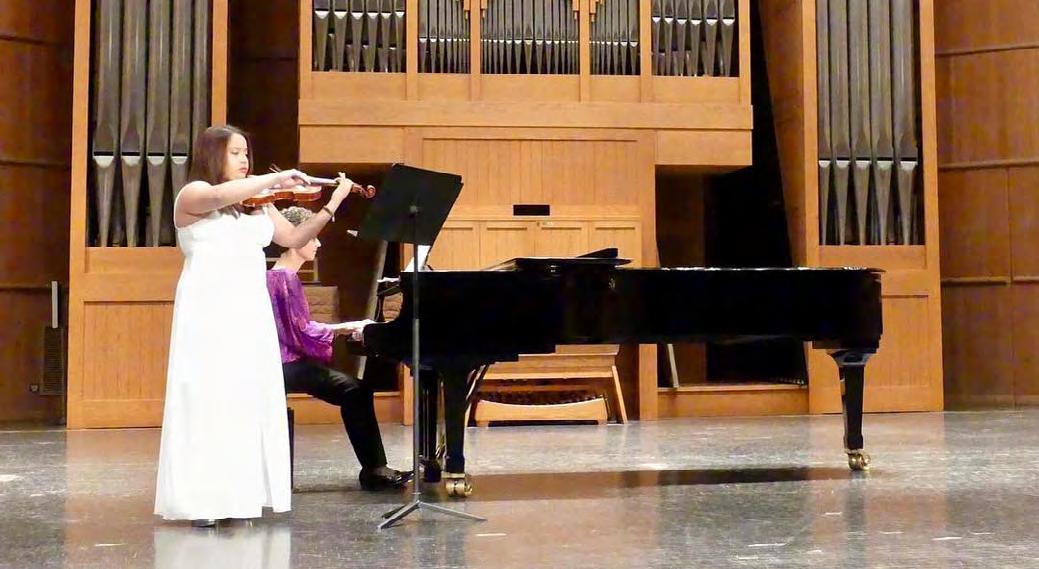
What role did the UTSA String Project play in your undergraduate life?
“Although I never felt called to pursue it as a career, I’ve always had a soft spot for teaching—I love working with kids so much! They’re so inspirational, funny, and fun to work with. In late high school, I started teaching private violin lessons as a side gig. When I got to UTSA, I learned that the Music Department had a program allowing the college students to teach young children in classroom settings, under the guidance of the professors. Dr. Pellegrino and Dr. Dowdy provided weekly guidance on enhancing our teaching skills, classroom management, and student engagement. I was involved with the String Project all four years of college. During that time, I had the opportunity to work with wonderful children while honing my music teaching skills. I am very thankful for that experience, which led to my first job teaching at The Talent House, a private music studio in Cypress. I taught there for four years and still occasionally substitute teach for them.”
How else has music education factored into your career path?
“I get to see firsthand how HGO contributes to music education through our dedicated Community and Learning department. They oversee various outreach programs, including summer opera camps and performances in local schools, libraries, and parks. One of my favorite things that they offer is a program for young kids called ‘Sing! Move! Play!,’ where they simplify and retell the stories of popular operas—such as The Magic Flute or Carmen—and implement music and movement. While music education isn’t my primary career focus, I’m grateful to recognize our company’s involvement in it. It’s incredibly rewarding to see organizations like HGO sharing their art with the community, engaging in local initiatives, and nurturing the next generation of music enthusiasts.”
Speaking of your role with the Houston Grand Opera, what has that experience has been like so far?
“Even after just one season at HGO as Digital Content Coordinator, I’ve gained such valuable experience and insight. And now with the new season rapidly approaching in October, I’m realizing how quickly time flies! It’s been an exciting journey, combining my existing knowledge with HGO’s approach to marketing, promotion, and brand awareness. I’m proud to say that our company is making strides to gain more and more recognition both locally and even internationally. This past season alone, I witnessed significant growth and am thrilled to be part of the team contributing to this success.”
Can you give me a rundown of what your position entails?
“Well first and foremost, I have the privilege of collaborating with our exceptional Audiences department, which includes Marketing and Communications, Customer Care, and Guest Experience. Our collective goal is to capture and retain our audience, and my role is to effectively utilize social media to achieve this goal. While we work together to brainstorm content ideas that align with our cohesive marketing approach, I’m responsible for bringing those ideas to life and sharing them on Facebook, Instagram, X (formerly known as Twitter), YouTube, and LinkedIn.
My role involves creating and scheduling content, engaging with our followers, and building our online presence. While it might seem simple to some people, planning and executing content strategically across multiple platforms with various assets—such as videos, graphics, photography, and blog posts— requires careful coordination. I work closely with our digital marketing team to create a strategic content calendar aligned with current promotions and events, and then collaborate with our graphic designers and videographers to ensure we have the necessary digital assets.
We’re honestly very fortunate at HGO to have a dedicated marketing team with highly talented professionals who are passionate about their work. I’m grateful to be part of such a well-equipped team, especially considering the limited resources and personnel many other arts organizations face.”
So how does your role fit into the grand scheme of things at your organization?
“I find that I play a pivotal role in HGO’s mission in sharing the power of opera with the world. My responsibilities extend beyond digital marketing; I am actively involved in building and maintaining our online community, promoting HGO’s performances and programs, and contributing to the overall success of our organization. Through creating engaging content that resonates with our audience, my role contributes to HGO’s mission and solidifies its reputation as a thought leader in the arts community—both right here in Houston and around the globe.”
Does HGO create any live streaming content?
“We produce two significant live-streamed events: Concert of Arias, a highly competitive singing competition where aspiring opera artists from around the world showcase their voices. The event is judged by a panel of renowned opera professionals, and some of the competitors receive an invitation to join our prestigious HGO Butler Studio.
Our other major live-streamed event, Giving Voice, is a collaborative partnership with Wheeler Avenue Baptist Church celebrating our city’s rich heritage. It features performances by talented singers and musicians, and serves as a platform for highlighting the contributions of Black artists to the world of opera.”
How does HGO’s marketing team curate content to effectively convey its messaging?
“Our department director is always emphasizing intentional marketing, so I’d like to give her all the credit for our department’s success on this. She’s taught us to think holistically about our marketing efforts, not just within our own workflow. We now cross-reference existing materials and dip into each other’s workflow in order to curate a cohesive content calendar. Whether it’s email, social media, billboards, or TV spots, we always strive to maximize the impact of our messaging.”
What are your thoughts on the current outlook for arts organizations over the next decade? Can you relate from your role about the need for modernization in the arts ensure future growth?
“That is such a difficult—and great—question. From what I’ve been seeing, there is a bit of a crisis going on in the industry, unfortunately. I’ve seen several arts organizations have to take away certain productions or completely cancel their season because of budget cuts, low ticket sales, and shrinking donor bases.
Not to toot our own horn…but I’m absolutely going to toot it. We just came out of one of our most successful seasons in 2023-24 in HGO history, and I think much of it has to do with our leadership and our mission as an arts organization. Our CEO and General Director, Khori Dastoor, has definitely revolutionized how
opera is being shared with our community. She came in with an objective of making it an art form that is absolutely accessible to everyone. In a recent interview with Houston Business Journal, Khori emphasized that ‘we made the decision early on to try to grow first before assuming that we couldn’t.’ HGO saw the impact of that in our past season, and we’re already thinking of how to continue this momentum.
As human beings, I believe there is a desire among people to experience life to the fullest, is there not? A desire for culture, a desire for art, a desire for community. That demand is there, and it will always be there, but how do we let people know that we can help them fulfill that need? Through our community engagement, strategic marketing, and philanthropic initiatives, we actively showcase HGO as a luxury music experience that is accessible to all, for as little as $25! We work hard to always be in touch with our audience and demonstrate our commitment to meet that demand.
I feel like once art organizations understand this demand, the message becomes, ‘How can we serve YOU?’ ‘This is what we can do for YOU’ ‘We would love to share this with YOU.’ It shouldn’t be, ‘Buy tickets now for the show!’ To me, that just feels very money-driven, not people-driven. As Khori stated, organizations should decide how they’re going to serve their patrons and grow from there—right from the very beginning. If more professionals had this philosophy at the core of what they do….I believe more organizations might find more success.”
How can music marketing students seeking a role in arts administration be proactive while studying?
“Start by researching local and regional arts organizations that align with your interests and skills. Immerse yourself in the music scene by attending shows and events. This will not only inspire you but also provide valuable networking opportunities. Do internships at these organizations.
And remember, your career path may not be immediately clear. Be open to new experiences and opportunities, and you may discover a passion for a specific area of music marketing that you never anticipated!”
Now that you’ve finished your first season with the Houston Grand Opera, how do you feel as the next season quickly approaches?
“My first season at HGO was initially a bit intimidating, especially as my first official job in my field of study. However, I believe I’ve grown significantly as a music marketing professional and gained confidence in my abilities. Having successfully navigated my first full season, I’m excited and prepared to take on the challenges of the next!”
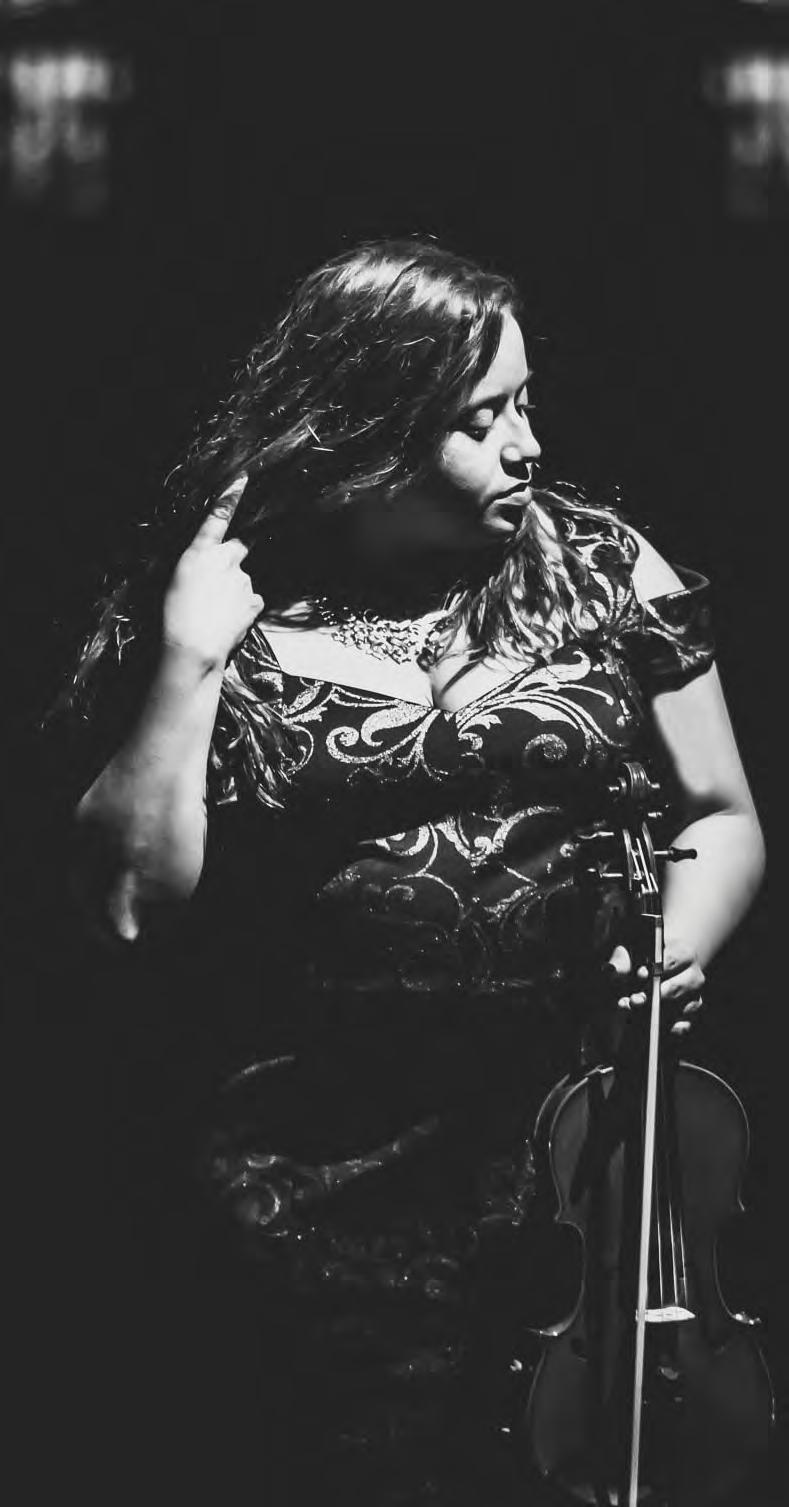
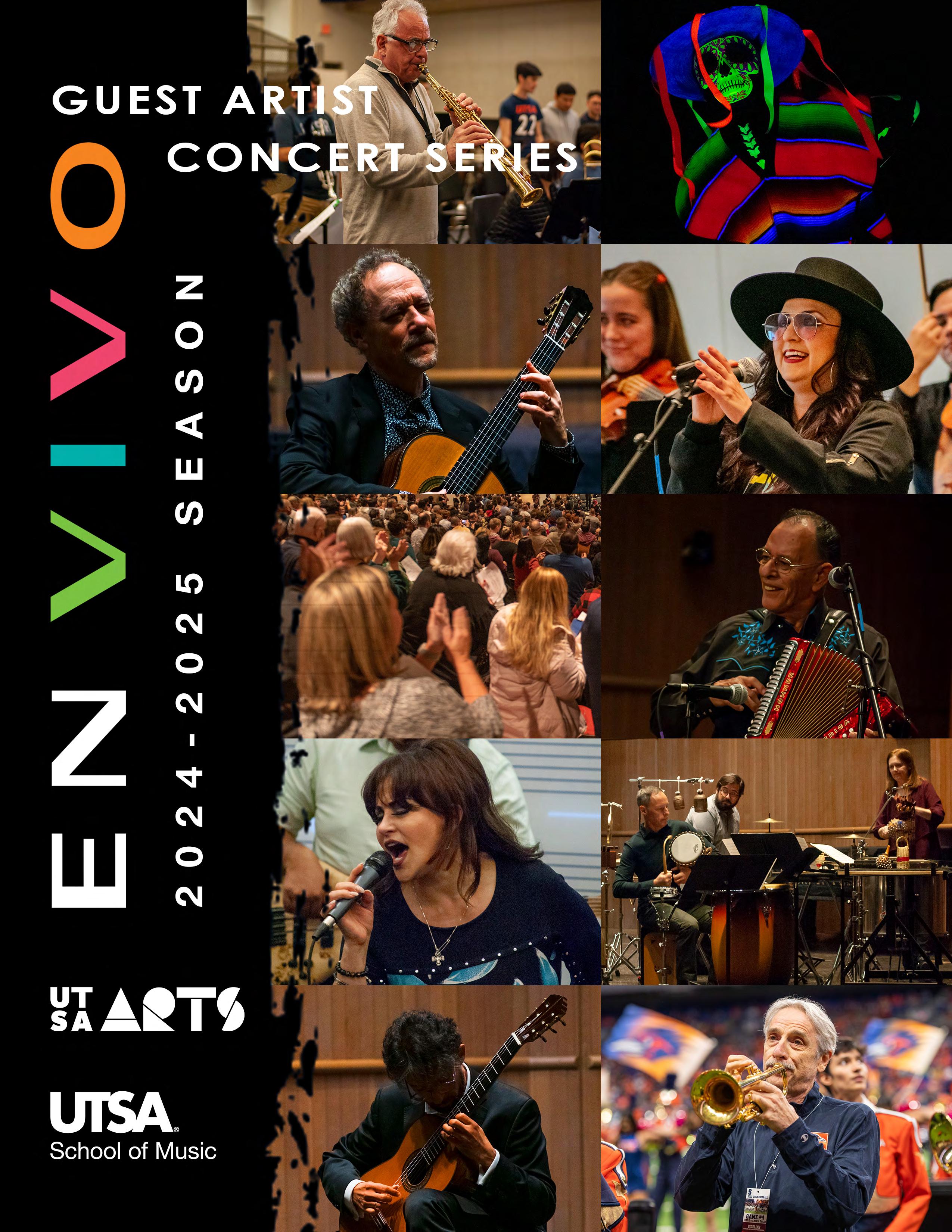
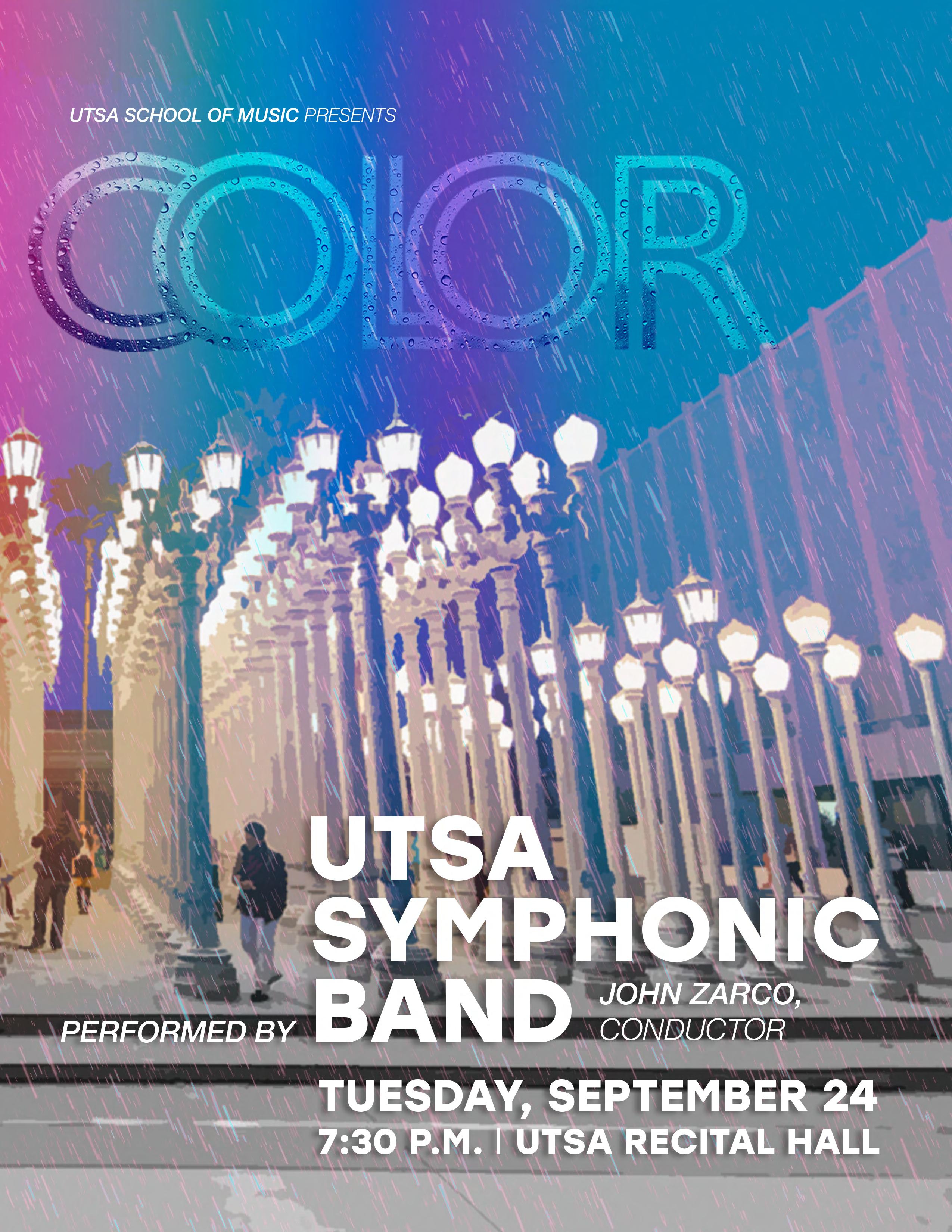
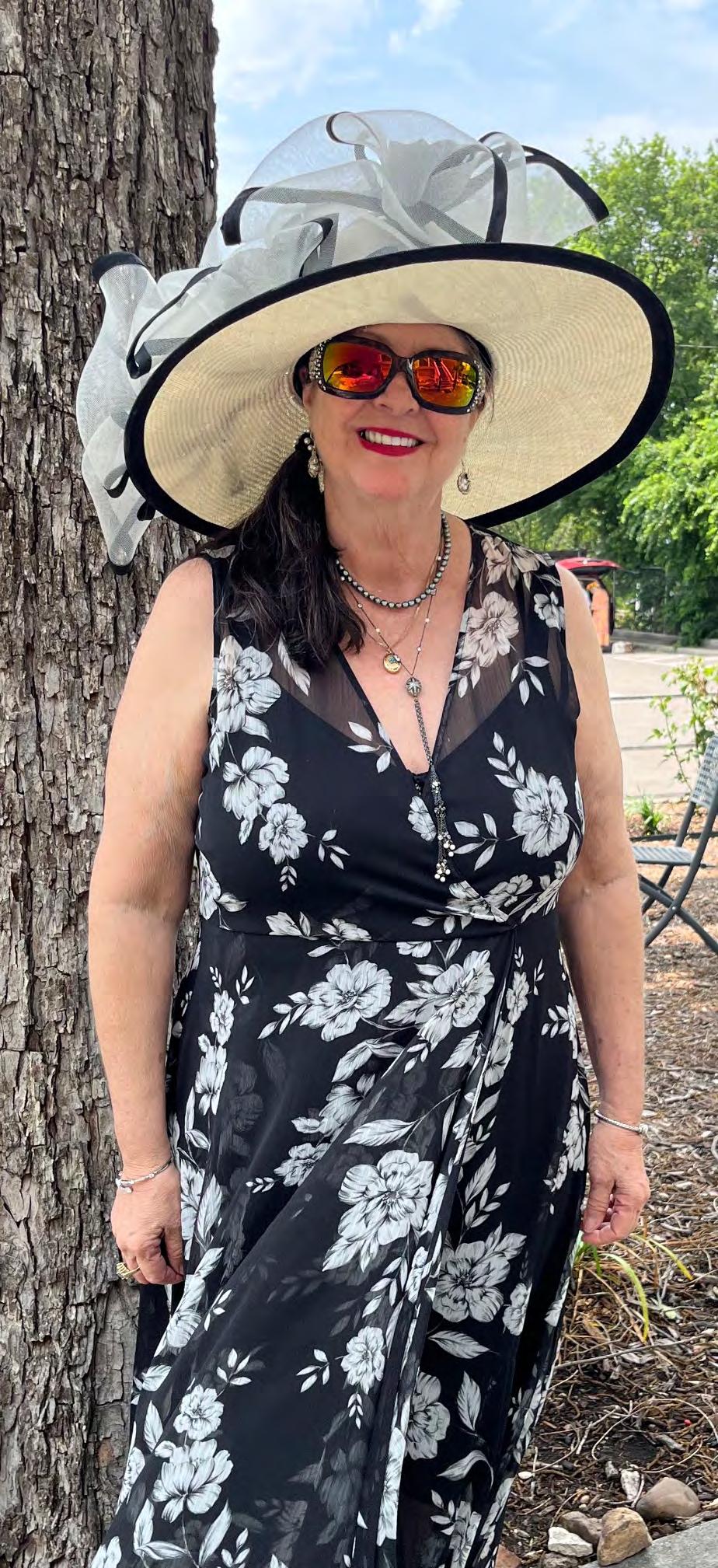
September 2024’s Cadenza marks the beginning of a new tradition where we recognize our generous donors who have made valuable contributions to the UTSA School of Music’s endeavors.
Linda Purcell is the program director for the San Antonio Music Club and has been a generous donnor to the UTSA School of Music over the years. In addition to her own personal contributions, the San Antonio Music Club, founded in 1939, annually raises money for music student scholarships.
“The more students we can sponsor, the bigger impact we can make. I think [individual expression] is the spiritual component in humans that will make us more creative...it’s something worth preserving.”
Purcell’s passion for music was instilled in her from an early age by her mother, who was a classically trained musician. She started by learning piano and later studied voice, eventually becoming an elementary music educator for a portion of her life. She holds a degree in Music Education from Texas State University and a graduate degree in Counseling. Her combined educational background led to her developing an interest in music therapy research.
“My motivating factor has always been the love and passion; the driving forces behind the music in my heart and soul that my mother gave me,” said Purcell.
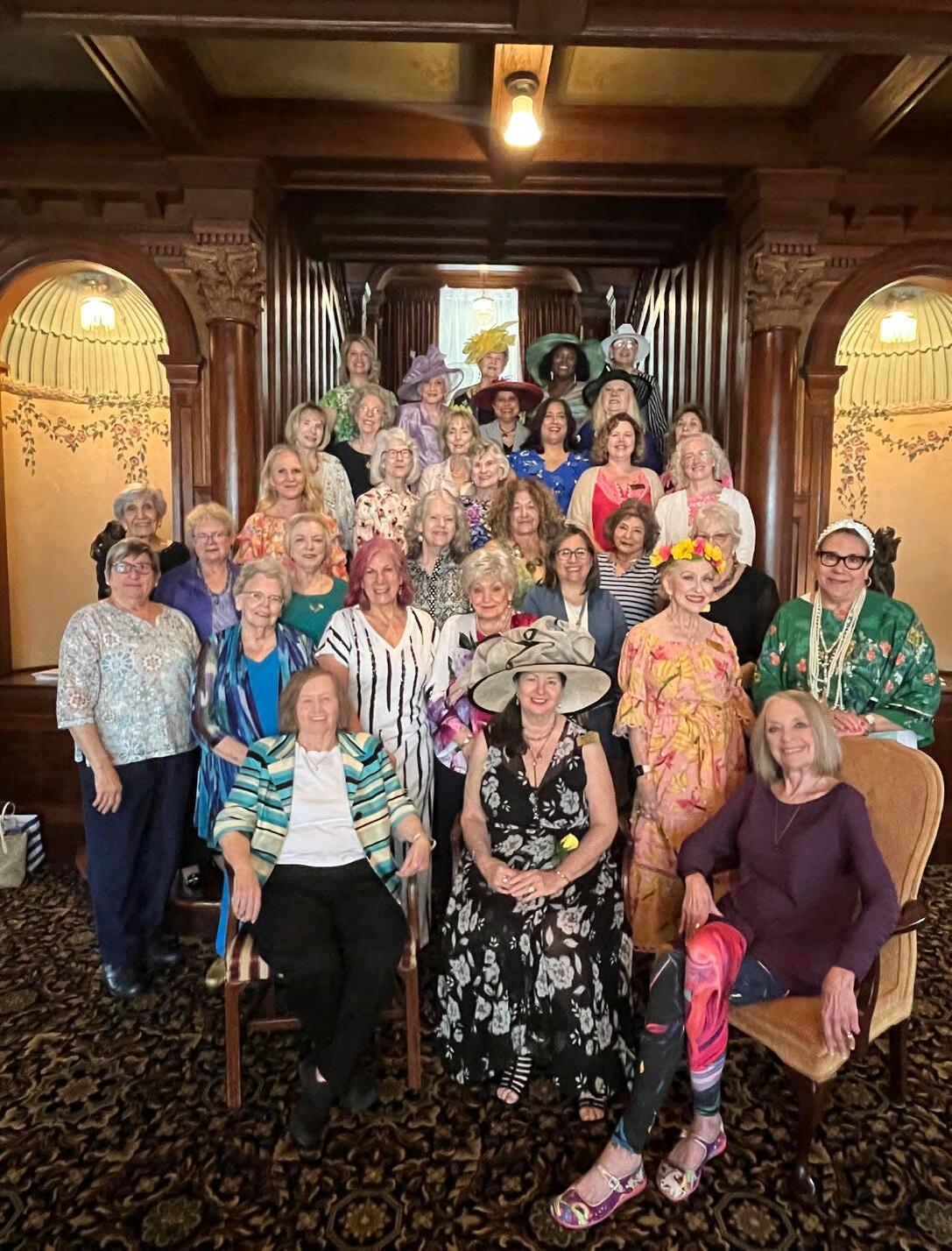
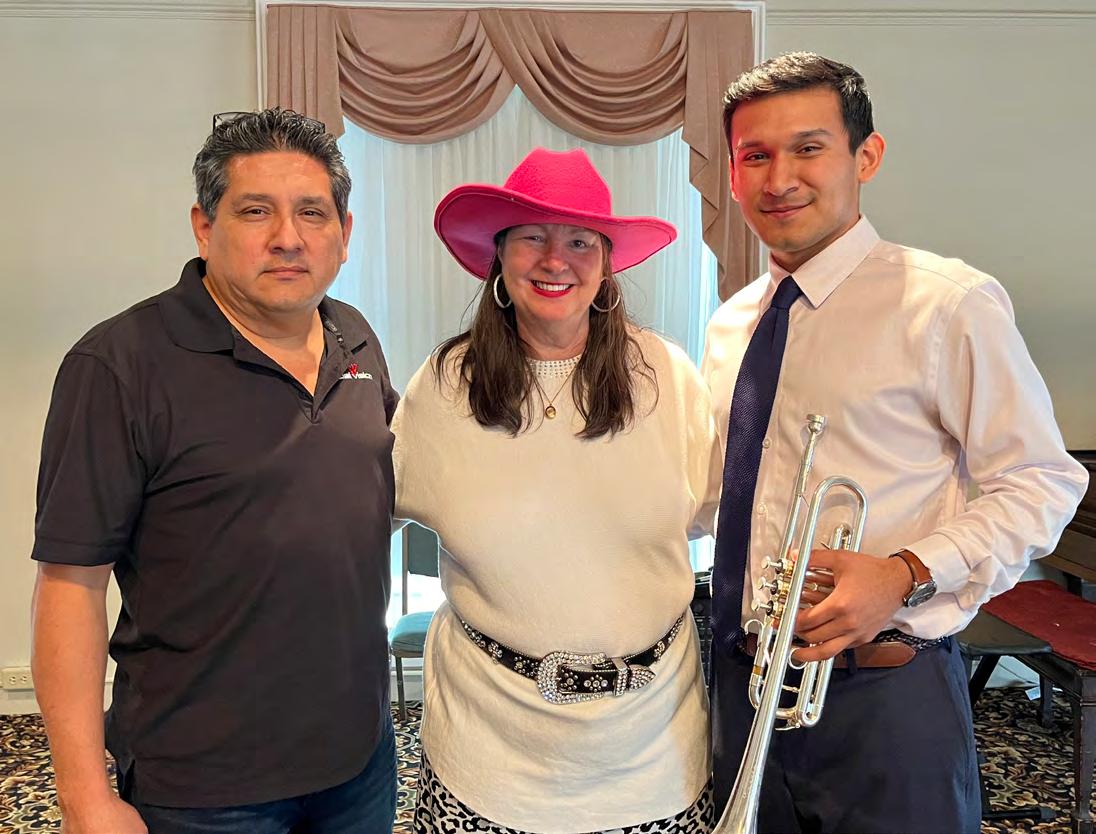
Linda Purcell with Celestino Rodriguez and his father
“It’s such a beautiful, artistic piece of who I am, and to be able to share with everybody is just it’s rich...no money can cut that.”
Purcell took on her role with the San Antonio Music Club in 2022. She was subsequently recognized for her philanthropic work in 20222023 by the Texas Federation of Women. She has remained a strong advocate for maintaining the club’s close ties to UTSA, seeing their sponsorship as a “stepping stone” for many students to reach their potential when provided the resources.
“If you can tap the heart out, the passion within the person, then you know you can plant [seeds] and grow,” said Purcell
Since taking over as program director, Purcell has forwarded intiatives to make student sponsorship feel more personal and supportive. In addition to keeping close contact with sponsored students, the club has them perform for members. It is during these performances that Purcell encourages students to go “outside the box” and be highly expressive and improvisatory.
Celestino Rodriguez, a trumpet player and UTSA alum, was sponsored by the organization during his senior year. Purcell described his performance for the club with the highest regards for his musicality.
“He was so expressionistic...I’ll tell you right now, no lady in there will ever forget that performance ever. It was phenomenally unbelievable,” said Purcell
Purcell recognizes the need for music education and the benefits it can have for mental health, personal development, and community relationships, which is enough to fuel her ambitions for supporting the arts.
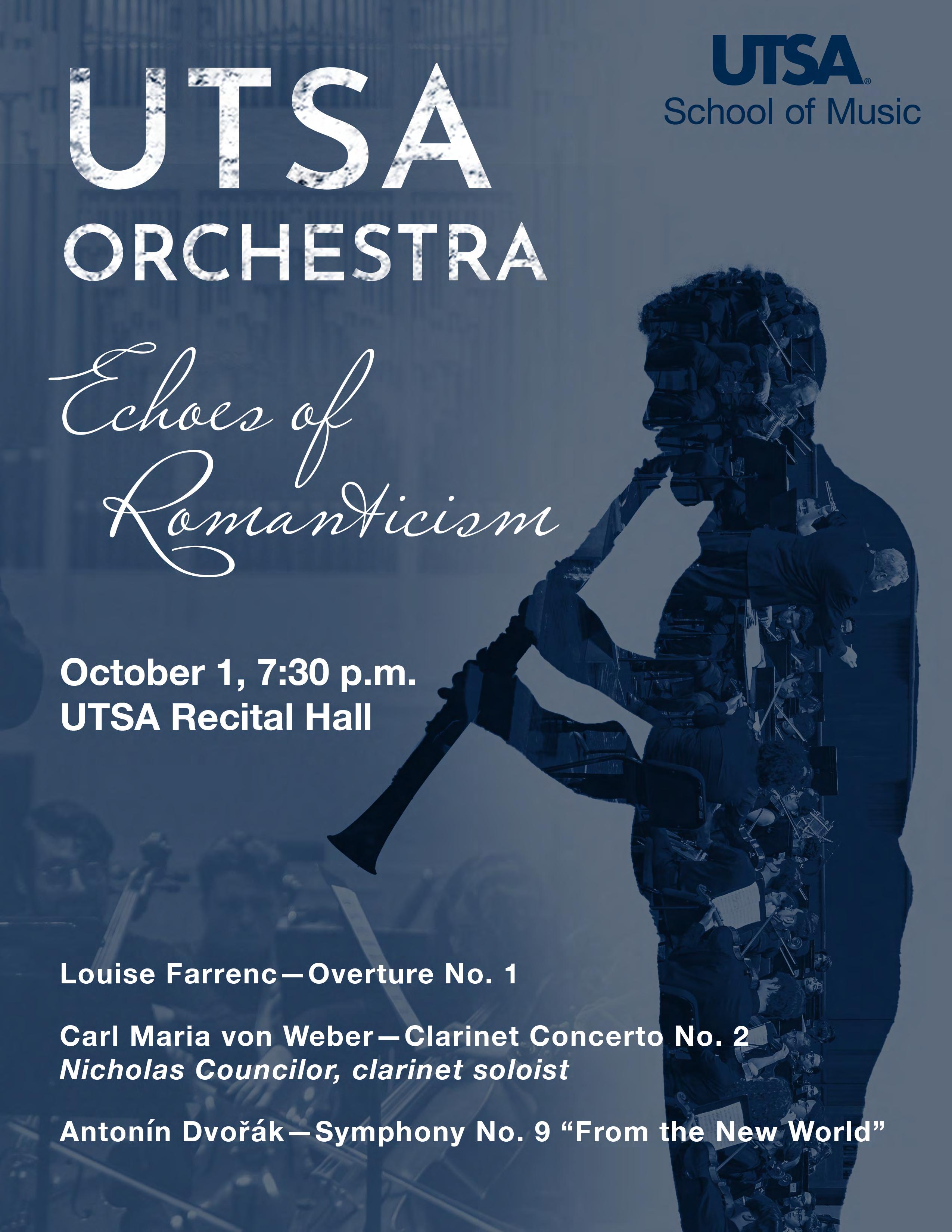
MUSIC
7:00 PM | John Peace
STUDENT RECITAL
7:30 PM | UTSA Recital Hall
SYMPHONIC BAND “Colors”
7:30 PM | UTSA Recital Hall
UTSA MARIACHI LOS PAISANOS
7:30 PM | UTSA Recital Hall
WIND SYMPHONY
7:30 PM | UTSA Recital Hall
UTSA ORCHESTRA
7:30 PM | UTSA Recital Hall
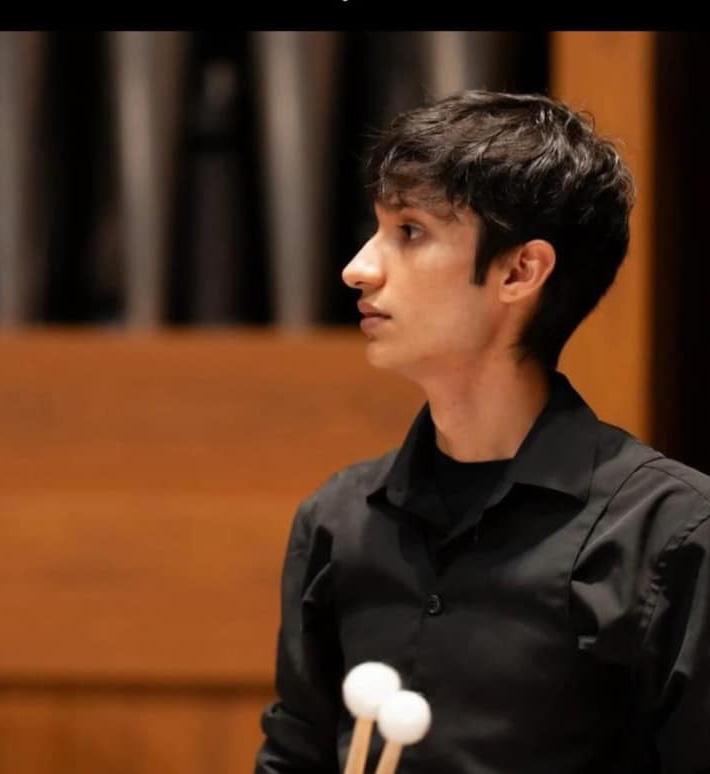
STAY UP TO DATE WITH THE LATEST INFORMATION ON THE UPCOMING SEMESTER AT UTSA MUSIC MUSIC.UTSA.EDU FOLLOW US! @UTSA


